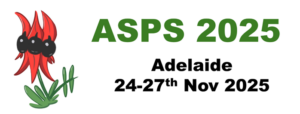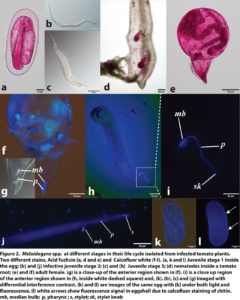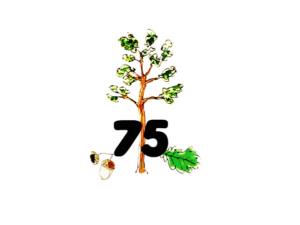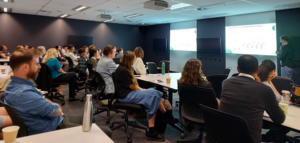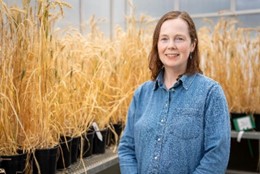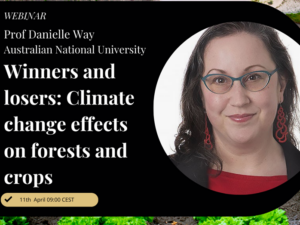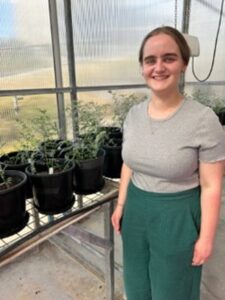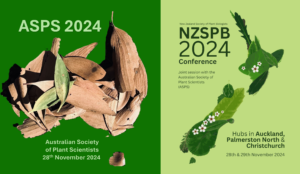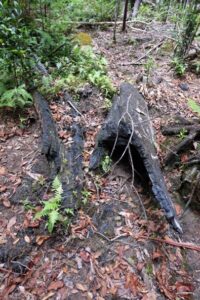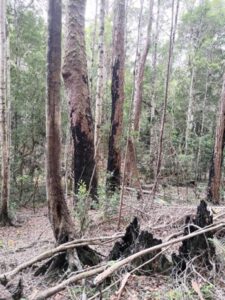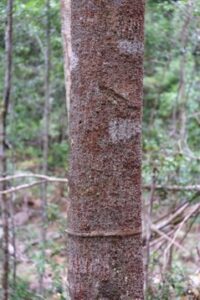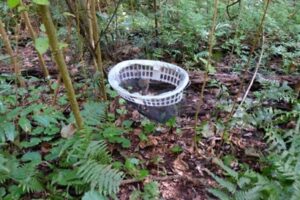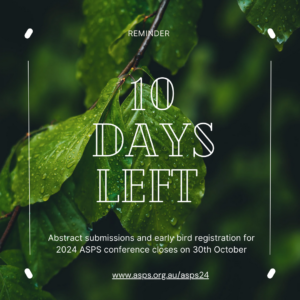- About
- Members
- Join
- Member log in
- Membership Renewal
- Member directory
- Life Members
- ASPS Life Member Professor Graham Farquhar
- ASPS Life Member Associate Professor Hendrik (Hank) Greenway
- ASPS Life Member Dr Marshall (Hal) D Hatch
- ASPS Life Member Dr Paul E Kriedmann
- ASPS Life Member Dr Mervyn Ludlow
- ASPS Life Member Emeritus Professor Rana Munns
- ASPS Life Member Conjoint Professor Christina E Offler
- ASPS Life Member Professor (Charles) Barry Osmond
- ASPS Life Member Emeritus Professor John W Patrick
- ASPS Life Member Dr Joe Wiskich
- Corresponding Members
- Elected Fellows
- Events
- Awards & Funding
- Employment
- Publications
- Research
- Teaching
- Menu
June 2025 Phytogen
30 June 2025
Welcome to the June 2025 Phytogen!
This month, we are excited to share important updates about the ASPS Conference 2025, including the launch of travel awards and expanded program details. We feature Alice Temara, a PhD student at the Australian National University, who shares her journey from Belgium to Australia and her research on leaf respiration and photosynthesis relationships. We also feature research insights from Dr. Robert Sharwood, our Education Representative, detailing his mission to develop climate-resilient crops through advanced photosynthesis studies.
As we approach the conference season, we encourage all members to stay engaged and plan their participation in our upcoming event. You can stay connected with ASPS on social media on the following platforms: LinkedIn, Australian Society of Plant Scientists; BlueSky: @asps-oz.bsky.social. Join the conversation using #AusPlantSci and #ASPS2025 (for the conference). Tag us in your posts to help us promote your science! Phytogen contributions will also be featured on our social media pages.
We welcome contributions from students, E/MCRs and established researchers at any time for publication in Phytogen. It is free and a great way to give your research profile a boost and share your findings! You can send your contribution to our editors Raz (razlin.azman@csiro.au) or Lucas (L.Auroux@latrobe.edu.au).
ASPS 2025 Conference Update
Travel Awards Now Open!
We are pleased to announce that ASPS travel awards are now available! Financial support is provided for students, carers, and indigenous members attending our Adelaide conference. This initiative reflects our commitment to ensuring diverse participation and accessibility for all members of our plant science community.
Registration opens in July 2025 – stay tuned for detailed registration information and early bird pricing!
Updated Conference Program
Building on our previously announced session lineup, we are pleased to provide additional program details:
Session Topics:
- The Future of Plant Science (student-led)
- Teaching, Outreach & Indigenous Learnings
- Nurturing Symbiosis – Insights from Early and Mid-career Researchers
- Stress Sensing, Signalling and Membrane Transport
- Plant Evolution & Ecology
- New Technologies & AI in Plant Science
- Plant Nutrition & Development
- Frontiers in Genetics & Molecular Biology
- Synbio / Green Biomanufacturing
- Plant Organelle & Energy Biology
- Industry-led Session
The program will feature keynote presentations, poster presentations, and networking opportunities (activities and dinner) designed to foster collaboration across the Australian plant science community.
For more information about the conference, including travel award applications and upcoming registration details, visit: https://www.asps.org.au/asps25
If you have any questions about the conference, contact Dr. Crystal Sweetman at crystal.sweetman@flinders.edu.au.
Student spotlight
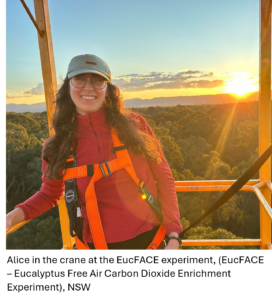 Alice Temara
Alice Temara
PhD Candidate, Atkin’s Lab
Australian National University, Canberra
LinkedIn: Alice Temara
My name is Alice Temara, and I come from Brussels in Belgium — a tiny European country, especially when compared to Australia… and many others. Here’s the story of how I ended up on the other side of the world.
My scientific journey began at the Université Libre de Bruxelles (ULB), where I completed both my bachelor’s and master’s Bioengineers degrees. In October 2022, while searching for an internship as part of my master’s program, I attended a conference at ULB about the impacts of climate change on Australian biodiversity, presented by Pr. David Ellsworth. At the end of his talk, I didn’t hesitate a minute — I approached him and asked whether he was looking for an intern. And guess what? Nine months later, I was working at Australia’s largest climate change research facility: the EucFACE experiment, at Western Sydney University in NSW. I studied the effects of elevated CO₂ on photosynthetic rates of shrubs and grasses using the Licor-6400. I also looked at the impact of phosphorus fertilisation as Australian soils lack phosphorus, compared to European soils being poorer in nitrogen.
It didn’t take long for me to realise that what truly excites me is studying climate change with the goal of making a real difference. I also discovered how much I enjoy working outdoors, immersed in nature and surrounded by unique flora and fauna.
After an incredible three-month internship, I returned to Belgium to pursue my studies and complete my master’s thesis. My thesis was based on a large dataset of photosynthetic measurements collected by ten leading scientists across 14 tropical rainforests in Australia, covering 132 species and 5 Plant Functional Types. As part of this research, I also had the chance to visit the Daintree Rainforest Observatory, the world’s oldest rainforest located in Queensland. Such an incredible place!
Leaving your friends and family behind to move across the globe is never easy. My experience abroad had its challenges, but most of it was absolutely amazing. So, when I came across a PhD opportunity at the Australian National University (ANU), focused on a topic closely aligned with my previous work — leaf gas-exchange measurements — and my passion for climate change research, I didn’t think twice. I applied, and I am now part of the Atkin’s lab in Canberra!
My PhD focuses on the relationship between leaf respiration and photosynthesis. While these two processes have been widely studied individually, few studies explore how they interact. I’m investigating whether this relationship is influenced by carbohydrate mobilisation and Rubisco content, across species from tropical, temperate, and boreal forests.
While my PhD began only three months ago, I’ve already had the chance to collect 2 weeks data at the Whole Tree Chamber (WTC), in Western Sydney University, and another week at the EucFACE site. Fieldwork involved day and night measurements – physically demanding, but always exciting, especially when local wildlife like snakes, kangaroos, or skinks drop by to say hello!
I’m truly excited to continue this journey, one that is already enriching me with new skills and unforgettable human experiences.
You can follow me on LinkedIn where I will share my experiences and research updates.
“Le mot de la fin”: Don’t hesitate to go abroad and explore – it might just change your life!
Education Representative Contribution
 The scientific mission to ensure future food and fibre production by developing climate adapted germplasm
The scientific mission to ensure future food and fibre production by developing climate adapted germplasm
Dr. Robert Sharwood,
ASPS Education Representative
Senior Lecturer in Translational Photosynthesis. Hawkesbury Institute for the Environment, Western Sydney University.
Perhaps the greatest challenge of our time is to ensure the sustainable production of nutritious food in a backdrop of severe changes in climate that impacts production of food and fibre. In general, crop production in Australia is often in water limited environments and with the threats of increasing heatwaves and drought conditions, we need to develop new germplasm that is adapted to these extreme climate scenarios. This in essence will require germplasm that is able to mitigate yield penalties associated with declines in photosynthetic carbon assimilation that provides the carbohydrate building blocks for plant growth and ultimately yield.
Within my group we study how the fundamental concept of how climate-of-origin influences the response of photosynthesis in crops and their wild relatives when challenged with heatwave and drought conditions. We explore how resilience to these climate challenges are achieved at both the leaf level biochemistry and genomic levels. We use latest phenotyping technologies to screen for changes in plant physiology to identify resilient plants that require a deeper investigation.
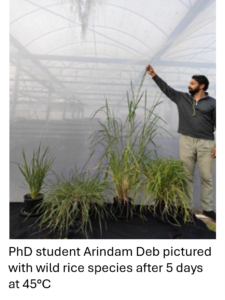 As an example, Arindam Deb a dual HDR Student with Keraala Agricultural University (KAU), India and Western Sydney University has been studying how wild rice copes with severe heatwaves. Pictured right is Arindam with his plants. He has analysed the gas-exchange response of photosynthesis on plants exposed to a 45oC heatwave and will focus on the underpinning biochemistry of CO2 fixation.
As an example, Arindam Deb a dual HDR Student with Keraala Agricultural University (KAU), India and Western Sydney University has been studying how wild rice copes with severe heatwaves. Pictured right is Arindam with his plants. He has analysed the gas-exchange response of photosynthesis on plants exposed to a 45oC heatwave and will focus on the underpinning biochemistry of CO2 fixation.
In a project funded by the ARC Discovery program in collaboration with Maria Ermakova (Monash University), Oula Ghannoum (WSU) and Robert Furbank (ANU), we are studying how the primary carboxylase of C4 photosynthesis, phosphoenolpyruvate carboxylase (PEPC), influences the CO2 concentrating mechanism through altering its content and catalytic properties. We have three PHD students, Sarah Fletcher, Jasmine Divinagracia and Umodhi Bokalamulla studying the various aspects of enhancing PEPC catalysis.
Recently, as a Co-CI, our team at HIE partnered with the Australian National University and the University of Western Australia was awarded an ARC training centre for Smart and Sustainable Horticulture. The mission of the centre is to train the next-generation practitioners in all aspects of protected cropping from developing new crops in protected settings, monitoring their growth for yield and disease and developing solutions for the sector to aim towards net-zero carbon emissions.
Help Shape the Voice of Functional Plant Biology Online
Are you passionate about plant science and skilled in social media? Functional Plant Biology is seeking a Social Media Editor (or multiple) to join its editorial team!
This is an opportunity for an early-mid career researcher to gain experience on the editorial board of a journal, contributing to the journal’s mission by enhancing its digital presence and engaging with the global plant science community. The Social Media Editor will work closely with the editorial board and publishing team to:
1. Promote journal content on BlueSky
2. Develop strategies to grow and engage the journal’s online audience
3. Highlight key research, authors, and special issues functional plant biology
4. Support outreach during conferences and events
We welcome expressions of interest from researchers, science communicators, and digital-savvy professionals who are enthusiastic about plant biology and science communication.
🔗 Learn more and apply here: https://www.publish.csiro.au/fp/ExpressionsofInterest
Applications are open now—please share this opportunity with your networks!
Is Your Membership Up to Date?
ASPS membership connects you with Australia’s plant science community and provides valuable professional development opportunities. Student memberships are available at reduced rates.
Membership Benefits:
- Access to a network of plant scientists across Australia
- Discounted registration for conferences
- Eligibility for ASPS awards and travel grants
- Regular updates through Phytogen newsletter
Become a member, check and/or renew your membership status HERE.
Editors’ note
Thank you for reading the June edition of Phytogen. We hope you’ve enjoyed learning about Alice’s inspiring international journey and Robert’s insights into educational innovation. With conference preparations underway and travel awards now available, we encourage all members to consider participating in our Adelaide conference. Stay tuned for our July issue, where we’ll provide registration details and highlight more exciting developments in Australian plant science research.
Newsletter written & edited by Lucas Auroux and Razlin Azman.Invited contributions: Alice Temara (Student Spotlight) and Robert Sharwood (Education Representative).
We thank all contributors for their valuable insights and continued support to the ASPS community.
May 2025 Phytogen
29 May 2025
Welcome to the May 2025 Phytogen!
This month, we are pleased to bring you exciting updates about the upcoming ASPS Conference 2025 in Adelaide, including session titles and provisional program information. We feature a message from our new ASPS President, Professor Brent Kaiser, outlining his vision for the Society’s future direction and initiatives. We also introduce Dr. Lim Chee Liew, our Cell Biology Discipline Representative, who shares insights into her research journey and vision for representing the cell biology community. We also share an announcement of the 75th anniversary of the Journal Experimental Biology SymposiumDon’t forget to check the extended application deadline for our prestigious awards and ensure your membership is up to date!
You can stay connected with ASPS on social media on the following platforms:
LinkedIn: Australian Society of Plant Scientists
BlueSky: @asps-oz.bsky.social
Join the conversation using #AusPlantSci and #ASPS2025 (for the conference). Tag us in your posts to help us promote your science! Phytogen contributions will also be featured on our social media pages.
We welcome contributions from students, E/MCRs and established researchers at any time for publication in Phytogen. It is free and a great way to give your research profile a boost and share your findings! You can send your contribution to our editors Raz (razlin.azman@csiro.au) or Lucas (L.Auroux@latrobe.edu.au). An example of an E/MCR contribution from Dr. Francine Perrine-Walker is available at the end of this issue. We also welcome Francine as the newest member of the Communications & Website sub-committee. She also handles our Society LinkedIn page.
ASPS 2025 Conference Update
We are excited to announce that the conference logo is now available, and provisional program details have been released for the ASPS 2025 Conference. Registration opens in June 2025, and we encourage you to start planning your participation!
Session Lineup:
- The Future of Plant Science (student-led)
- Teaching, Outreach & Indigenous Learnings
- Nurturing Symbiosis – Insights from Early and Mid-career Researchers
- Stress Sensing, Signalling and Membrane Transport
- Plant Evolution & Ecology
- New Technologies & AI in Plant Science
- Plant Nutrition & Development
- Frontiers in Genetics & Molecular Biology
- Synbio / Green Biomanufacturing
- Plant Organelle & Energy Biology
- Industry-led Session
For more information about the conference, including abstract submission guidelines and registration details, visit the conference website: https://www.asps.org.au/asps25.
If you have any questions about the conference, contact Dr. Crystal Sweetman at crystal.sweetman@flinders.edu.au.
Award Applications Deadline extended!
Applications for the prestigious ASPS awards (Jan Anderson Award, Peter Goldacre Award, Teaching and Outreach Award) have been extended until 6 June 2025. The winners will be given an opportunity to present at this year’s conference in Adelaide
For detailed information and application guidelines, click here.
Update from the Society Executive
Thanks for checking in and reading the recent Phytogen issue. Phytogen has been an important and cherished communication platform for ASPS, offering all members an opportunity to highlight their recent plant science activities. This year, we’ve decided to include an ASPS executive report in future Phytogen issues to broaden the communication between the executive and ASPS members. We think this will be a better way to communicate what is happening in ASPS and report on our ongoing activities.
Since I’ve taken the reign as President of ASPS in January 2025, it’s been an interesting time re-acquainting myself with the inner workings of the society and trying to understand the current and future role ASPS has for the diverse group of plant scientists it represents. My previous tenure as Treasurer (2014-16) was enjoyable, in that I met many new members (especially the aspiring students) who came to the society to be part of the larger Plant Science community across Australia. Now as President, a bit greyer, battered and hopefully wiser, I’m intrigued of where we can take ASPS and how best to see its growth and prominence expand amongst the scientific societies across Australia.
Ensuring our plant science community remains together and interconnected will be a priority of mine and the executive for the next two years. I’m quite aware of how time poor each of us is, and how this can undermine the required engagement necessary to make societies like ASPS tick. The executive will work hard to ensure relevance of ASPS to minimize possible slips in engagement or interest.
Looking forward, our society requires growth and a larger presence domestically and internationally to help manage the many external influences, including fickle whims of our funding agencies towards plant science, the proliferation of alternative sub-disciplinary groupings diluting the plant science community, and the ongoing indifference by many in government and the community towards the importance of plants to a healthy and sustainable society.
Over the last two months, we’ve been reaching out to other Australian and international plant-related societies to create new partnerships and reciprocal membership opportunities to broaden the scope of an ASPS member, including equal access to society activities (meetings, seminars, and maybe student fellowships). We hope to finalise a number of these partnerships over the coming months which will enable greater choice for all ASPS members, but most importantly strengthen the link between Plant Scientists often separated by their disciplinary niche and region. The greater the base and the interconnectedness, the more effective we will be in influencing representation in new funding opportunities and supporting our existing and future plant scientists to remain excited and engaged in the plant sciences. I look forward to the upcoming discussions.
Kind regards,
Brent N. Kaiser
President of the Australian Society of Plant Scientists.
Cell Biology Discpline Representative
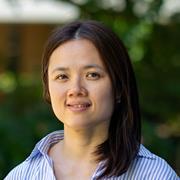 Connecting cells, scientists, and stories: my journey in plant science
Connecting cells, scientists, and stories: my journey in plant science
By Lim Chee Liew, Research Fellow
ASPS Cell Biology Discipline Representative, l.liew@latrobe.edu.au
X: @LimCheeLiew; Academic Profile.
It’s an honour to step into the role of Cell Biology Discipline Representative for the Australian Society of Plant Scientists (ASPS). This opportunity comes at a reflective time in my career where research, communication, and community-building continue to intersect in exciting ways.
From legumes to single cells
My journey into plant biology began with a fascination for the unseen mechanisms that guide life in plants. From my early work in legume photoperiodism during my PhD at the University of Tasmania, I’ve since traversed fields from soybean flowering to single-cell transcriptomics in Arabidopsis and barley. Over time, the scale of my research has progressively narrowed, from studying whole plant systems to zooming in on individual cells and molecular networks. Over the past decade, I’ve had the privilege of working across institutions like the University of Melbourne and La Trobe University, with collaborators spanning Australia, Europe, and Asia.
Today, as a postdoctoral fellow at La Trobe University’s AgriBio, my work focuses on applying cutting-edge genomic and single-cell technologies to understand how plant cells acquire identity and coordinate during critical developmental processes including seed dormancy and germination. It’s a thrilling time to be a plant cell biologist, especially as spatial and single-cell methods begin to reshape how we view tissue complexity and cellular dialogue in plants.
From plants to pipelines
A tipping point came during a transcriptomics project. I had collaborators handling the bioinformatics, but I felt disconnected when I was unable to interpret the data or even ask the right questions. I didn’t want to be a passenger on this journey. I wanted to co-pilot it.
As a wet lab plant scientist with no formal training in coding, stepping into the world of Bash, R, and Python was initially overwhelming as these tools felt as foreign as a new language. The learning curve was steep, and I encountered every common mistake, from misplacing commas in scripts to accidentally deleting files. Yet, each error became a learning opportunity. With help from online courses, open-source communities, and persistent trial-and-error, I slowly gained the confidence and skills to manage my own data analyses.
This transformation, from data-dependent to data-empowered, has made me a more independent and integrative researcher, capable of connecting experimental biology with computational insight.
Bringing Research to Life Through Communication
Beyond the bench, I’ve long been committed to bridging science and society. Whether delivering a public talk at Pint of Science (“How do plant cells work together to start their life?”) or delivering an outreach program like “Plant Life on Mars” for secondary students, I believe in making plant science tangible and relevant.
I’m especially interested in how communication strategies, from public talks to social media, can amplify research impact. In our age of open science and digital connectivity, every plant scientist is also a potential science communicator. It’s a responsibility I embrace wholeheartedly.
Championing Community and Mentorship
Equally rewarding has been my role in fostering the scientific community within universities and beyond. As chair of a social and wellbeing committee at La Trobe, I’ve helped create events that strengthen connections across research teams. As a lecturer and supervisor, I mentor the next generation of plant scientists, guiding projects in genomics and transcriptomics and helping students grow as thinkers, collaborators, and communicators.
Through these experiences, I’ve come to see community-building as essential scientific work, not separate from our research but supportive of it. After all, thriving science depends on thriving scientists.
Looking Ahead: Representing Our Cell Biology Community
As the ASPS Cell Biology Discipline Representative, I hope to amplify the voices and needs of researchers working in our dynamic field. Whether you’re investigating organelle dynamics, transcriptomes, or applying omics to dissect cellular development, I want to hear from you.
Let’s find ways to connect our work more broadly through joint symposia, early-career researcher highlights on social media, or outreach opportunities that showcase the relevance of plant biology to real-world challenges. If you’re keen to get involved or share ideas, please get in touch. I’m excited to serve and grow with this vibrant community.
E/MCR Contribution
 Fluorescence in the root knot nematode’s pharyngeal region – Is it an artefact of calcofluor white staining?
Fluorescence in the root knot nematode’s pharyngeal region – Is it an artefact of calcofluor white staining?
by Francine Perrine-Walker (PhD), University of Sydney
Member, ASPS Communications & Website Sub-committee
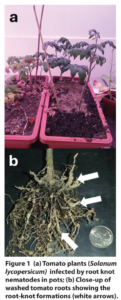 A paper by Sun et al. [1] demonstrated that the free-living soil nematode Pristionchus pacificus had two chitin synthases, chs-1 and chs-2, key enzymes for chitin synthesis in eggshell and teeth formation respectively. The same authors highlighted by bioinformatic analyses that both chs genes were conserved in other species including Meloidogyne hapla [1].
A paper by Sun et al. [1] demonstrated that the free-living soil nematode Pristionchus pacificus had two chitin synthases, chs-1 and chs-2, key enzymes for chitin synthesis in eggshell and teeth formation respectively. The same authors highlighted by bioinformatic analyses that both chs genes were conserved in other species including Meloidogyne hapla [1].
Root knot nematodes (Meloidogyne spp.) infect the roots of many agriculturally important crops. As obligate plant root parasites, one way to maintain Meloidogyne spp. cultures in a greenhouse is by inoculating tomato plants in pots (Fig. 1 a-b). Though time consuming, large quantities of inoculum can be obtained for plant pathogenicity or infection studies.
In a collaboration investigating the negative impact of plant pathogenic nematodes on coffee, I used different stains to identify plant pathogenic nematodes in roots.
The acid fuchsin stain is standard for bright field imaging and involves clearing roots. Nematodes appear red in colour inside the egg (Fig. 2a) and within root sections (Fig. 2 d-e). If unstained one can have a difficult time finding them as shown in (Fig. 2 b-c).
Another stain, calcofluor white, was used to detect chitin in the eggshell of nematodes (Fig. 2 k-l). Surprisingly, a fluorescence signal was detected in certain parts of the root knot nematode i.e., the medium bulb (mb), the stylet (s), and the pharynx (p) (Fig. 2 f-j) after some extra time being exposed to the stain prior to viewing under fluorescence microscopy.
Is this an artefact? What other techniques could one use to verify if a chitin synthase is localised to the pharyngeal region of Meloidogyne spp.?
Journal of Experimental Botany (JXB) 75th Anniversary Symposium
Edinburgh International Conference Centre
This meeting celebrates the 75th anniversary of the founding of the Journal of Experimental Botany in 1950. The history of the journal can be likened to the lifetime of a tree, germinating from the seed of an idea and growing into a mature form that supports a diverse community. The meeting will not only reflect these life stages – Beginnings, Growing and Maturity – but also look to the Future, as we face the challenges of the next 25 years. The meeting will bring together established and upcoming plant researchers to build links between people and research communities, share our knowledge and inspire ideas to help the next generation meet these challenges.
For more information about the conference, see our website.
**UPDATE – we are now offering travel grants to help researchers attend the meeting, check our Travel Grants page for more information.
Is Your Membership Up to Date?
ASPS membership connects you with Australia’s plant science community and provides valuable professional development opportunities. Student memberships are available at reduced rates.
Membership Benefits:
- Access to a network of plant scientists across Australia
- Discounted registration for conferences
- Eligibility for ASPS awards and travel grants
- Regular updates through Phytogen newsletter
Become a member, check and/or renew your membership status HERE.
Editors’ note
Thanks for reading the May edition of Phytogen. We hope you’ve enjoyed the updates from our President and Cell Biology Discipline Representative. Stay tuned for our June issue, where we’ll highlight more exciting developments in plant science research across Australia and update you about our upcoming conference!
Newsletter written & edited by Lucas Auroux and Razlin Azman.
We would like to thank Dr. Lim Chee Liew (ASPS representative), Prof. Brent Kaiser (President) and Dr. Francine Perrine-Walker for their contributions to this issue.
April 2025 Phytogen
28 April 2025
Welcome to the April 2025 Phytogen!
We are back to our regular issue, and we have lots to share! We have reports from our representatives at Science Meets Parliament (SMP) 2025 and highlight our partnership with Functional Plant Biology. We have our monthly student contribution, this month featuring Suyan Yee from the Australian National University, and update from Dr Dugald Reid, (Whole Plants discipline rep) on the recent ASPS events in Victoria. To round up this issue, we have a contribution from ASPS member Dr Francine Perrier-Walker from University of Sydney. Also, don’t forget to renew your membership, if you haven’t already!
The ASPS Conference 2025 will be held in Adelaide in November. Remember to SAVE THE DATE! There is also still time to apply for the ASPS awards
You can stay connected with ASPS on social media on the following platforms. Join the conversation using #AusPlantSci and #ASPS2025 (for the conference). Tag us in your posts and stories to help us promote your science! Phytogen contributions will also be featured on our social media pages.
- X:@asps_ozplants
- LinkedIn: Australian Society of Plant Scientists
- BlueSky:@asps-oz.bsky.social
We welcome contributions from students, E/MCRs and established researchers at any time for publication in Phytogen. It is free and a great way to give your research profile a boost and share your findings! You can send your contribution to our editors Raz (razlin.azman@csiro.au) or Lucas (L.Auroux@latrobe.edu.au).
ASPS 2025 Conference
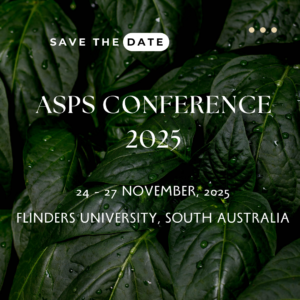
Start planning your participation now! More details will be available in upcoming Phytogen issues and on the conference registration website opening in June. If you have any questions about the conference, please contact Dr. Crystal Sweetman at crystal.sweetman@flinders.edu.au.
Award Applications Deadline extended!
Applications for the prestigious ASPS awards (Jan Anderson Award, Peter Goldacre Award, Teaching and Outreach Award) have been extended until 6 June 2025. The winners will be given an opportunity to present at this year’s conference in Adelaide
For detailed information and application guidelines, click here.
ASPS at Science Meets Parliament (SMP) 2025
This year the ASPS was represented by Dr. Nipuni Peththa Thanthrige and Dr. Ashley Jones at Science Meets Parliament. Below are their reports about this valuable experience.
Dr. Nipuni Peththa Thanthrige
Institute of Molecular Bioscience, The University of Queensland
 In February 2025, I had the pleasure and privilege of co-representing the Australian Society of Plant Scientists (ASPS) as a delegate at Science Meets Parliament in Canberra. This flagship annual event, organised by Science and Technology Australia, marked its 25th anniversary this year, celebrating a quarter-century of connecting STEM experts with policymakers and parliamentarians. Over two vibrant days, I joined a community of passionate scientists and engaged directly with influential leaders, learning how we can play a more active role in shaping Australia’s future.
In February 2025, I had the pleasure and privilege of co-representing the Australian Society of Plant Scientists (ASPS) as a delegate at Science Meets Parliament in Canberra. This flagship annual event, organised by Science and Technology Australia, marked its 25th anniversary this year, celebrating a quarter-century of connecting STEM experts with policymakers and parliamentarians. Over two vibrant days, I joined a community of passionate scientists and engaged directly with influential leaders, learning how we can play a more active role in shaping Australia’s future.
Day 1 was filled with engaging sessions focused on science communication, leadership, advocacy and policy. One standout session was Pitch Perfect: How to Talk About Your Science to the Media, which featured some of Australia’s top science communicators. They taught us how to effectively communicate complex science in a way that captures the imagination of policymakers, the public, and the media. The key takeaways were: “know your audience, speak with excitement and clarity, and use relatable language.” Another memorable session, Leading with Science: Elevating STEM for Economic Growth, highlighted the pivotal role research and innovation play in driving national prosperity. Also, I had the opportunity to attend the National Press Club address by the Hon Ed Husic MP, Minister for Industry and Science. He spoke candidly about Australia’s research and development (R&D) performance and the structural issues outlined in the government’s newly released strategic examination of the R&D system discussion paper. I also had the privilege of briefly speaking with Hon Minister Husic during the event about my current research.
The day concluded with an interesting session on Indigenous knowledge systems, which explored how indigenous knowledge can help address current and future challenges. Also, Mr. John Paul Janke from National Indigenous Affairs Editor, NITV shared a powerful perspective on First Nations knowledge and cultural heritage, reminding us of the deep-rooted scientific insight embedded in Australia’s history.
That evening, we celebrated the 25th Anniversary of Science Meets Parliament with a Gala Dinner at the National Museum of Australia. Surrounded by scientists, STEM superstars, academics, and policymakers, the evening was a brilliant tribute to the enduring impact of this program.
Day 2 began with an incredible opportunity to meet the Hon Senator Slade Brockman, Liberal Senator for Western Australia. We had an engaging discussion about the critical role of plant and agricultural research in sustainably feeding the growing global population. Senator Brockman expressed genuine interest in my current work using plants as biofactories to develop next-generation therapeutics. It was deeply rewarding to share how plant science research contributes not only to global food security but also to innovative health solutions and environmental sustainability—an approach the Senator strongly agreed with.
Another unforgettable highlight of Day 2 was the session ‘Using STEM for the Greater Good’, where the Hon Senator Mehreen Faruqi delivered a deeply inspiring and empowering talk. Her key message – ‘Feel the fear and do it anyway- it’s worth it’- was a powerful call to action for early career scientists. Her journey from environmental and civil engineer to Deputy Leader of The Australian Greens and federal parliamentarian served as a strong reminder of the meaningful and impactful roles scientists can play in public service and policymaking.
The event concluded with a fascinating conversation between Australian astronaut Katherine Bennell-Pegg and Nobel Laureate Distinguished Professor Brian Schmidt AC, who reflected on the limitless potential of Australian science.
Attending the Science Meets Parliament 2025 was an unforgettable experience. It provided a valuable opportunity to engage with policymakers and connect with passionate scientists from across Australia. The event was filled with energy, great conversations, and a shared commitment to strengthening the connection between science and policy. I’m truly grateful to ASPS for this opportunity and highly recommend it to fellow plant scientists. It’s a great way to build networks and be inspired by the important role we all play in shaping Australia’s future.
Dr. Ashley Jones
Post-doctoral Research Fellow, Research School of Biology, Australian National University (ANU)
Science Meets Parliament (SMP) stands as a pivotal annual event in Australia, bridging the divide between the scientific community and the nation’s policymakers. The 2025 iteration marked a significant milestone, celebrating its 25th anniversary of fostering these crucial connections. Thanks to the Australian Society of Plant Scientists (ASPS), I was fortunate to be one of the 397 delegates, amongst various STEM professionals and parliamentarians from across the political landscape. The two-day event was an enriching opportunity to learn, engage with policymakers, and reflect on how my own science could influence the complex process of national policy development.
The opening session by University of Canberra vice-chancellor Bill Shorten centred on the critical need for scientists to proactively communicate their innovations to the broader public, and emphasise the potential benefits for Australian society, education, and the economy. He highlighted that most Australians likely do not know what scientists are doing, describing R&D as a massive river nourishing the land, but it is silent and few know it’s there. Mr Shorten urged scientists to think about what happens if you weren’t doing your current research, what are the consequences?
Lunch was held at the National Press Club, with an address delivered by the Minister for Industry and Science, Ed Husic. A key announcement during his speech was the unveiling of the government’s discussion paper for the Strategic Examination of Research and Development. Mr Husic wants to strategically reposition Australia from a predominantly consumer of technology to a dynamic and innovative producer. He hit some home-run truths we all need to consider. Australia is at the top for research but amongst the bottom for integrating our discoveries into the economy and community. Australia is the ~8th richest country but 102nd on economic return. Mr Husic highlighted that science isn’t finished until it is communicated, adopted and implemented. Otherwise, there is no impact.
Photo: Lunch at the National Press Club, with an address by the Minister for Industry and Science, Ed Husic. I met him in person at the Science Meets Parliament gala dinner held at the National Museum of Australia
I really enjoyed the afternoon talk by John Paul Janke, National Indigenous Affairs Editor at NITV. He broadened everyone’s understanding of the profound contributions of Indigenous Australians to the realm of science and knowledge. The emphasis on ‘untold stories’ powerfully illustrated the existing gaps in the common understanding of Australia’s history and the scientific contributions of its First Peoples. It was an honour to thank him in person later that evening at the SMP gala dinner, held at the National Museum of Australia. It was a key networking event, I also met Ed Husic, Governor-General Sam Mostyn, Chief Scientist Prof Tony Haymet and CSIRO Chief Executive Prof Doug Hilton.
 Photo: Gala dinner at the National Museum of Australia, with the Governor-General Sam Mostyn (left), and CSIRO Chief Executive Prof Doug Hilton (right).
Photo: Gala dinner at the National Museum of Australia, with the Governor-General Sam Mostyn (left), and CSIRO Chief Executive Prof Doug Hilton (right).
The second day of SMP we had a scheduled meeting with a political member, which was definitely an exciting and rare opportunity. I was one of three scientists lucky to be selected by Independent Senator David Pocock (which did trigger a little envy among delegates). It was a very busy time in parliament house, pressure from the upcoming election and important documents needed to be finalised. Senator Pocock’s office was very warm and welcoming. Seeing many decorative items on Australian natives, endangered species, biodiversity and the natural environment made perfect sense why I was chosen. A red light and alarm on the wall clock quickly started to engage, David had to go to senate! However, we were welcome to stay, got to know his political staff and watch in real time on a monitor that streamed the senate. His staff showed us some more of parliament house and took us to the senate entrance. Despite a hectic schedule, David made time for us outside the senate. We talked at length about the inherent difficulties in garnering sustained political support for scientific endeavours and how David really wanted to make a change for a better future. We pitched our science, what we were researching, and how it has benefited Australia. We talked about how we can translate our science to the next level, and how politicians and scientists can work together to achieve that outcome. Our conversation also touched upon the university sector, where we all (including David) expressed concerns regarding the leadership and governance of the ANU, especially in relation to financial management and transparency.
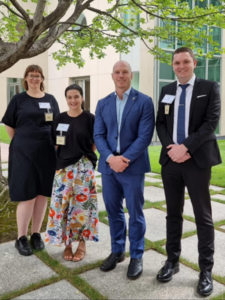 Photo: Three scientists meet Independent Senator David Pocock at Parliament House.
Photo: Three scientists meet Independent Senator David Pocock at Parliament House.
It was really intriguing to witness David’s own experience in the role of an independent in Australian democracy, with his capacity to inject fresh perspectives and renewed energy into the democratic process. I hope David is re-elected, as we definitely need more of his passion and energy in politics to bring change. Since SMP, David has been very active on many political fronts, including campaigning for better protection of our native plant and animal species, fighting to conserve the natural environment, and calling for a federal inquiry into the leadership at ANU, advocating for better governance.
In conclusion, SMP 2025 personally highlighted the crucial role of dialogue between science and politics in shaping Australia’s prosperity and well-being. The event’s success in fostering this collaboration is evident, and I am personally committed to continuing to contribute to a more scientifically informed society and government. It was a wonderful opportunity to engage with policymakers and connect with enthusiastic scientists from across Australia, and I highly recommend this experience to others.
Student Contribution

Suyan Yee (she/her)
PhD Candidate, Chan Lab
Division of Plant Sciences, Research School of Biology, The Australian National University
Connect with Suyan: Academic ANU Profile | X: @scienceYeeSu
Suyan’s scientific interest in maintaining plant productivity under stressful events stems from her childhood familiarity with frequent natural disasters affecting her grandparents’ veggie garden. This has ultimately led her to a PhD at the Australian National University (ANU), where she is currently a final year doctoral candidate in Kai Chan’s lab.
Her research journey began with a multidisciplinary Honours project in the Pogson and Corry labs at ANU. During this project, she computationally and biochemically characterised several molecular inhibitors of a key phosphatase implicated in stress-activated chloroplast signaling, with the goal of ‘priming’ and fine-tuning plant responses to abiotic stress.
Suyan then expanded her skill set by venturing into a technical research role with the Realising Increased Photosynthetic Efficiency (RIPE) project, funded by the Gates Foundation. “Being part of an international research consortium gave me a newfound appreciation for the innovation and productivity that sharing scientific knowledge and resources can achieve.”
Her PhD work now integrates aspects of these research areas, where she uses C4 plant systems to uncover distinct mechanisms that drive and protect photosynthesis in individual specialised leaf cells during abiotic stress. “By combining cutting-edge single cell transcriptomics with biochemical and live-cell imaging approaches, my research aims to provide novel strategies for future crop engineering efforts to overcome the yield-resilience trade-offs that plague traditional approaches of improving plant stress tolerance.”
Reflecting on research and her PhD journey so far, Suyan says, “The best part has been not only learning something new every day, but also being the first to discover it. It also feels incredibly rewarding to troubleshoot everyday challenges in the lab with creative solutions.”
Functional Plant Biology and ASPS
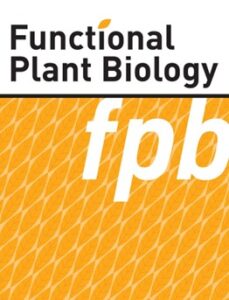
Functional Plant Biology is committed to working closely with the society to put Australian Plant Scientists in the spotlight and support the society in its goals.
We will use these opportunities in the future to highlight good news stories from the journal. As a community, your passion for the science you pursue deserves to be celebrated. We want the journal to contribute to this celebration of your community and highlight success when it occurs.
We are excited to continue our sponsorship of the Peter Goldacre Award. In addition, we are introducing a new Sponsorship for a Travelling Speaker Award to the ASPS conferences, aimed at supporting researchers who wish to share their work at your conferences and meetings. We will also continue our support of the ASPS-FPB Best Paper Award for Early Career Research.
Some ways in which Functional Plant Biology (and CSIRO Publishing) are working to support your publishing efforts:
- If you are based at an Australian or New Zealand institution, you may be eligible to publish Open Access in Functional Plant Biology at no charge to your research budget thanks to our Read and Publish Agreements. These agreements are not subject to caps.
- If you are a member of the ASPS based outside of Australia, or you have collaborators in Lower Income Countries, we are actively working to support their access to both read and publish in Academic Journals. We have recently signed the Research4Life Pact which guarantees cost-free Open Access publishing for those authors affected by these barriers.
- We have also recently signed an agreement with ResearchGate, improving the visibility of content in the journal.
“We look forward to working together to promote Australian Plant Science. Thank you for your support, and we are excited about the opportunities ahead”
Pat Hannah, Journal Manager at CSIRO Publishing
For more information on submitting to Functional Plant Biology, visit www.publish.csiro.au/fp or you can contact Pat (pat.hannah@csiro.au) for further information.
Recent ASPS events in Melbourne (VIC)
Whole Plants representative of the ASPS
Senior Lecturer, La Trobe University
Following the annual meeting ASPS Melbourne members resolved to try to meet 1-2 times per year with cross-institutional meetings including invited speakers or local ASPS meets. This provides good opportunities for student presentations and networking in Melbourne. If you are interested in organising an event or have an international guest that would be a suitable speaker, then please get in touch so we can organise our next meeting (dugald.reid@latrobe.edu.au).
Engineering photosynthetic carbon fixation for crop improvement
February 18th, hosted by Maria Ermakova (Monash)
Speaker: Professor Christine Raines, University of Essex, UK
Christine Raines discussed the potential of increased photosynthesis to improve crop plants, highlighting the Realizing Increased Photosynthetic Efficiency (RIPE) project and the potential yield benefits of elevated photosynthetic conversion efficiency. At higher CO2 concentrations, RuBP regeneration is most limiting, and SBPase overexpression is one approach to increase biomass and yield potential. The work highlighted the importance of going to the field where small cumulative benefits that might not be dramatic as a point-in-time measurements can lead to increases in biomass over a growing cycle.
ASPS Annual Meeting 2024
28th November 2024 | La Trobe City Campus
We had approximately 60 attendees with a mix of student and postdoc presentations and posters, followed by a dinner at the Bang Pop Thai restaurant and bar at Southbank
E/MCR Contribution
 A PROTOTYPE VERSUS A PROOF OF CONCEPT
A PROTOTYPE VERSUS A PROOF OF CONCEPT
By: Dr. Francine Perrine-Walker
The University of Sydney
Connect with Francine: LinkedIn
In the lab, we were interested in the role of arbuscular mycorrhizal fungi (AMF) in legumes as previous studies had shown that the AMF Glomus mosseae could transfer labeled nitrogen (N) via its mycelia to Sorghum bicolor (1). There was a problem: How could we measure N transport from AMF to legumes using labeled N in soil?
Before designing and running any plant growth experiment, we needed to think about the ideal plant growth system needed to address the problem i.e. N acquisition during beneficial plant-microbe interactions. Field experiments would be too expensive and soil microcosms have been shown to be easy to handle and inexpensive. They could be maintained under controlled conditions and provide more reproducible results than field tests, but the laboratory had no device, i.e., a soil microcosm growth system on-hand to use.
Two approaches could have been used: a) To ask fellow colleagues about what systems they used to run such experiments and through a collaboration use an established system or, b) To delve into past published studies to find soil microcosm designs that would address the problem we wanted to investigate. The latter was chosen, and with a colleague, Ralph Faux, a suitable soil microcosm design was found (Fig. 1a-c). After some months, gathering various materials from overseas and other components around the Centre for Carbon, Water and Food (Camden Campus), and dealing with problems in assembling the materials leading to modifications in the design, our soil microcosm prototype was built!
I did not know if the modified prototype could maintain plant growth. Furthermore, I knew nothing about the soil composition needed for such experiments and it was good to work with Ralph due to his background in ecology and soil science. We mixed soil types such as fine and coarse sand, coir (for organic matter), and soil samples collected from different locations at different ratios.
As time was against us (end of my 1-year contract), we tested the growth of plants in our prototype using various soil mixtures and vetch seedlings in the controlled environment facility (CEF; without labeled N). Every 2-3 days, plants were watered. After 28 days, the soil microcosms were dismantled (Fig. 1d).
Ideally, the soil mixtures would be sterilized prior to use for future experiments. However, use of the unsterilized soil mixtures allowed us to observe the formation of nodules. Furthermore, by trypan blue fungal staining, fungal structures were found within vetch roots (Fig. 1e-f). More work would be needed to refine the experimental protocol but failing quickly with the prototype allowed us to validate the proof of concept (or part of).
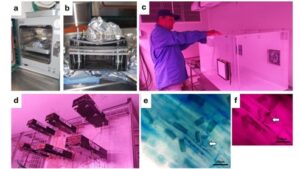 Testing of the modified microcosm prototype in the autoclave and it did not survive the test as shown in (b); (c) Ralph setting up in the CEF room; (d) setup of soil microcosms; (e) and (f) trypan blue staining of vetch roots displaying a putative fungal arbuscule within a plant root cell. Part of this work was presented at the Nitrogen 2023 conference. The modified prototype was based on the design by Kakouridis et al (2)
Testing of the modified microcosm prototype in the autoclave and it did not survive the test as shown in (b); (c) Ralph setting up in the CEF room; (d) setup of soil microcosms; (e) and (f) trypan blue staining of vetch roots displaying a putative fungal arbuscule within a plant root cell. Part of this work was presented at the Nitrogen 2023 conference. The modified prototype was based on the design by Kakouridis et al (2)
References:
(1) Koegel et al. (2013) Plant Signal Behav 8, doi:10.4161/psb.25229
(2) Kakouridis et al. (2022) New Phytol 236, 210-221, doi:10.1111/nph.18281.
Is Your Membership Up to Date?
ASPS membership connects you with Australia’s plant science community and provides valuable professional development opportunities. Student memberships are available at reduced rates.
Membership Benefits:
- Access to a network of plant scientists across Australia
- Discounted registration for conferences
- Eligibility for ASPS awards and travel grants
- Regular updates through Phytogen newsletter
Become a member, check and/or renew your membership status HERE.
Editors’ note
Phew, that’s a lot of plant science to catch up on! Thanks for staying with us.
Newsletter written & edited by Lucas Auroux and Razlin Azman.
We would like to thank all the contributors for this issue: ASPS representatives for SMP Dr. Nipuni Peththa Thanthrige, Dr. Ashley Jones, Functional Plant Biology & Pat Hannah, Dr. Dugal Reid and Dr. Francine Perrine-Walker.
Invited contribution: student contribution by Suyan Yee.
March 2025 Phytogen
26 March 2025
Welcome to the March 2025 Phytogen!
This month is a special issue: Women shaping the future of plant science in Australia. We are grateful to have two amazing guest editors for this issue Beth Loveys and Alison Bentley. In this issue, we have Conversations between early carrier scientist and established researchers, and Research Profiles of women making an impact with plant science research. We hope you enjoy this special issue we put together to celebrate International Women’s Day.
Global Plant Council (GPC) webinar showcases one of our own! Prof Danielle Way (ANU) will be presenting on the effects of climate change on forests and crops.
The editorial team accepts contributions anytime for publication in Phytogen. Please get in touch with editors Raz (razlin.azman@csiro.au) or Lucas (L.Auroux@latrobe.edu.au) if you are interested in contributing to Phytogen.
Reminder: The new ASPS website is currently underway, and we need plant science images! Consider sending us your plant science-related research photos to be used on the new website. For copyright reasons, please do not send any images that have been published or that you are planning to publish. Images for consideration for the new website can be sent to Phytogen editors or Janet Wheeler.
Women shaping the future of plant science in Australia
Celebrate women: today and everyday
March 8th marks International Women’s Day, a day dedicated to women’s rights. Theresa Malkiel is credited as the founder of the International Women’s Day movement, having organised its precursor, National Women’s Day in the United States in 1909. It is both sobering and inspiring to realise that the movement has existed and been driven forward by the courageous and unwavering passion of many women and allies, for so long. At a time when changing politics is attempting to push back against important progress in promoting diversity, equity and inclusion we feel it is timely and important to highlight just a few of the female scientists shaping Australian plant science (and science more broadly). Women have long contributed to plant sciences around the world. Beccy Saunders experimented with Biscutella laevigata providing evidence of Mendellian segregation, Barbara McClintok revolutionised understanding of transposable elements in maize and Jean White-Henry developed biological controls for prickly pear but to name a few. This continues today, with the women we highlight here, and many others who you will know in your institutions, organisations and communities, all making diverse and important contributions to plant science. Here we take a wide view of plant science: from the lab, to the glasshouse, to the field, and into many spaces above and beyond. In this respect it is notable that as well as being an equality activist, Theresa Malkiel was an advocate for education. It is therefore fitting that we showcase several women in our community and across career stages who are dedicated to training and empowering the next-generation. We hope that you enjoy this special issue celebrating women shaping the future of plant science in Australia and that you take it as an invitation to acknowledge and support the women around you, today and everyday.
Beth & Alison
Meet our Guest Editors

Before becoming an Education Specialist, Beth Loveys had a traditional path in academia. She gained her PhD in plant ecophysiology in 1998. Her postdoctoral positions at the University of York (UK), and then at the Australian National University, examined the effects of climate change on plant growth, specifically temperature elevated CO2. In her current position Beth supports the next generation of Agricultural Science and Viticulture and Oenology students in the School of Agriculture Food and Wine at The University of Adelaide. Improving learning outcomes and student engagement has been Beth’s motivation in recent years. Beth’s success has been recognised by: Office of Learning and Teaching Citation for Outstanding Contribution to Student Learning, SA Science STEM Educator finalist, Stephen Cole the Elder Award for Excellence & Vice Chancellors and Presidents Award for Excellence & the Australian Awards for University Teaching.
Crop scientist Alison Bentley’s research aims to understand the plant processes that can be used as an engine-room to drive agricultural productivity and build climate resilience for a more food secure future. Alison works primarily on major staple cereal crops given their global significance and has experience in a range of research environments in Australia, Vietnam, the USA, the UK and Mexico. Alison has a doctorate in agricultural science and a PhD in agriculture from The University of Sydney. She founded and leads Women in Crop Science, a network to boost connections, increase visibility, and foster greater gender equity in crop science. Alison is a passionate science communicator and a Superstar of STEM, aiming to open doors for more women to pursue and thrive in STEM careers. This month sees her move from her current role as a Research Group Leader and Deputy Director of the Agrifood Innovation Institute at the Australian National University to become the Deputy Director, Science in Agriculture and Food at CSIRO.
Conversations
There are so many amazing women working across the breadth of Australian plant sciences at all career stages. Although it isn’t possible for us to showcase them all in this Special Issue, we wanted to introduce you to a range of women from different backgrounds working in plant science across the country. To do this we recruited a batch of brilliant early career scientists who we co opted into having a chat with women within and beyond their networks. Here’s what they heard.
Sadia Majeed met Dr Rachel Walshe
 I am a PhD student in the ARC Training Centre for Future Crops Development at the Australian National University. I completed my training at The Islamia University of Bahawalpur in Pakistan, where I also worked as an Agriculture Officer in the Department of Agriculture Extension. In 2023, I moved to Australia to begin a PhD in the Furbank lab, focusing on improving canola productivity by enhancing photosynthesis. My research explores genetic and physiological strategies to optimize carbon assimilation and growth efficiency in canola, with the goal of increasing yield potential under future climate scenarios.
I am a PhD student in the ARC Training Centre for Future Crops Development at the Australian National University. I completed my training at The Islamia University of Bahawalpur in Pakistan, where I also worked as an Agriculture Officer in the Department of Agriculture Extension. In 2023, I moved to Australia to begin a PhD in the Furbank lab, focusing on improving canola productivity by enhancing photosynthesis. My research explores genetic and physiological strategies to optimize carbon assimilation and growth efficiency in canola, with the goal of increasing yield potential under future climate scenarios.
I had the opportunity to talk to Dr Rachael Walshe, a food systems researcher and educator at the University of Canberra and a Project Officer at Sustain, a health promotion charity and social enterprise. We met as participants on an International Women’s Day panel at the ANU celebrating the women shaping the future of agriculture. Rachael shared the motivations behind her work on community gardens as crucial spaces for food resilience and engaging the next generation, particularly in urban environments. She highlighted how important it was for her to ensure that people, especially children, can eat and feed themselves and develop pride in growing things and eating them. Beyond community gardens, Rachael shared that her favourite plant is currently purslane (Portulaca oleracea), an invasive but edible weed. Racheal is keen on wild and urban foraging and purslane is currently top of her list as a resilient, under-valued resource (she enjoys it pickled). Rachael’s father, a rebel and disruptor, has played an inspiring and influential role in her career, growing up on a 100-acre organic garlic farm in the bush embedded in Rachael a love for hands-on food production. Meanwhile her Pop, a medical doctor, conveyed the importance of systemic change and the need to start with listening.
Connect with Sadia: Sadia Majeed | ANU Research School of Biology
Connect with Rachael: Rachael Walshe | LinkedIn
Dr Alison Gill met Dr Tatiana Soares de Costa
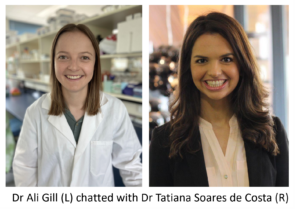
I am a Postdoctoral Research Fellow with the ARC Centre of Excellence in Plants for Space at the University of Adelaide. My interests include plant physiology, optimising photosynthesis to improve crop productivity, and plant responses to abiotic stress, with a particular focus on controlled environment agriculture. I chatted with Dr Tatiana Soares da Costa, an ARC Future Fellow and Head of the Herbicide and Antimicrobial Innovation Lab at the University of Adelaide. Coincidentally, both Tatiana and I had inspirational female year 12 teachers that ignited our interests in science and led us both to pursue a Bachelor of Science. Though Tatiana’s background is in drug discovery, biochemistry and chemistry, her career path has taken her into novel herbicide development by leveraging expertise she had gained in biomedical research. Tatiana describes her career journey as “non-traditional”, with experiences in both academia and industry. She credits her transferable skills developed in drug discovery with helping to transition into herbicide research, highlighting the shared biochemical building blocks of plants and bacteria.
During her career, particularly as she moved into plant science, Tatiana has been grateful for the mentorship and support of many female plant scientists who provided advice and training. She is most motivated by teaching and mentoring students to help shape their journey. I was especially inspired by her optimism and willingness to take risks, both of which have led into a career she could never have imagined. Tatiana’s advice is to not be disheartened by negative results and setbacks but rather embrace them as opportunities for new directions.
Connect with Ali: @aligill_ (X), @aligill.bsky.social (Bluesky), www.linkedin.com/in/ali-gill-plantscience
Connect with Tatiana: @Tatiana_Biochem (X), @tatiana-biochem.bsky.social (Bluesky), www.linkedin.com/in/dr-tatiana-soares-da-costa-7061ba120
Hanh Vo met Dr Tory Clarke
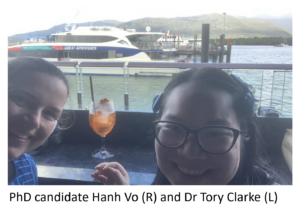 As a woman who just started her research journey working on plant responses to low humidity at UTAS, I’m curious about what’s waiting ahead. I had a wonderful catch up with Dr Tory Clarke, a plant physiologist working in sustainable agriculture at UTAS Tasmanian Agriculture Institute. She was my summer research and Honours supervisor at ANU, now a dear friend of mine, and I wanted to talk more with her about being a woman in science.
As a woman who just started her research journey working on plant responses to low humidity at UTAS, I’m curious about what’s waiting ahead. I had a wonderful catch up with Dr Tory Clarke, a plant physiologist working in sustainable agriculture at UTAS Tasmanian Agriculture Institute. She was my summer research and Honours supervisor at ANU, now a dear friend of mine, and I wanted to talk more with her about being a woman in science.
We started off with a couple of general questions to prompt discussion and soon got sidetracked into the pros and cons of working in academia on the small island of Tasmania. We agreed it’s often a double-edged sword, and navigating academia is both challenging yet exciting and sometimes rewarding. For instance, being at the only University on an island can be limiting, but because we are so far away, surrounded by nature, we can often escape the politics and just focus on our research. Similarly, academia doesn’t offer the stability of an office job, so you’re constantly worrying about the next grant or where to find your next position, but it also gives you flexibility in your day-to-day work, and there’s excitement as a new project or job can open up new possibilities and ideas.
We talked about how science can feel a bit isolating: sometimes it is just you and a plant, and you don’t really share with anyone about your struggles. A grant application is rejected, you get negative feedback on a manuscript, or you feel left behind after career breaks. You look around and see that everyone else seems to be doing much better than you: this person is publishing another paper, and that person just got a permanent position. The imposter syndrome kicks in, and you don’t want to tell anyone, because what if you just aren’t actually good enough? In academia, it’s hard not to feel inferior when we are constantly judged and rated for “success”. But if you are brave enough to share your challenges, you realise everyone has struggles, and we’re all just trying to do our best. Maybe you feel brave enough to ask for mentoring from a woman who balances kids and her career, or a colleague who’s also moved across the world to do science in a new language? We both agreed that the mentorship we’ve had from women who have navigated these waters too has been a huge part of our story. So find the people who lift you up with them, find other women, and speak up about what needs to change. Maybe your story will help someone else feel like they belong here too?
Connect with Hanh: @HanhPlantGene (X), @hanhplantgene.bsky.social, https://www.linkedin.com/in/hanh-minh-vo10/
Connect with Tory: @Curious_Tory (X), https://www.linkedin.com/in/tory-clarke-b30940173/
Gabriella Jessica and Eleanor Imlay met Professor Christine Beveridge
 Professor Christine Beveridge is not only an accomplished researcher but also an enthusiastic and welcoming presence, no small feat in the rush of today’s busy lifestyle. She is a fellow of Australian Academy of Science, an ARC Georgina Sweet Laureate Fellow, a Clarivate Highly Cited Researcher, a former President of the International Plant Growth Substances Association, and the Director of the ARC Centre of Excellence for Plant Success in Nature and Agriculture. Her work seeks to understand the developmental processes underlying shoot growth and dormancy. Highlights from this research include uncovering the roles of strigolactone and sugar signalling in branching. More recently, Christine has been excited to develop a working model to understand how different genetic and physiological networks co-contribute to shoot development. We were lucky to be able to sit down with her and discuss her experience as a woman in research.
Professor Christine Beveridge is not only an accomplished researcher but also an enthusiastic and welcoming presence, no small feat in the rush of today’s busy lifestyle. She is a fellow of Australian Academy of Science, an ARC Georgina Sweet Laureate Fellow, a Clarivate Highly Cited Researcher, a former President of the International Plant Growth Substances Association, and the Director of the ARC Centre of Excellence for Plant Success in Nature and Agriculture. Her work seeks to understand the developmental processes underlying shoot growth and dormancy. Highlights from this research include uncovering the roles of strigolactone and sugar signalling in branching. More recently, Christine has been excited to develop a working model to understand how different genetic and physiological networks co-contribute to shoot development. We were lucky to be able to sit down with her and discuss her experience as a woman in research.
Christine came to science in a non-linear fashion. In an era where women embarked on traditionally feminine career pathways, she enrolled to study teaching at university only to find “through processes of elimination” that she enjoyed the natural sciences. Her supervisor ignited her fascination with plants’ intelligence and adaptability, and she began her journey as a plant scientist. She views research as an exploration, and her enthusiasm leaves us with the impression that no barrier cannot be re-framed as an opportunity. Chrisitine remarks that she perceives one of the biggest challenges for early career researchers today is the feeling of overwhelm that comes from entering a well-established field saturated with data from new technological advances. Simultaneously, she highlights how these same technologies have encouraged people to collaborate and find community in their work, thereby promoting a shared curiosity and passion for any given field.
When asked about her advice for women in research, Christine stresses the importance of endurance, authenticity and enjoying what you do. She draws inspiration from her peers in as much as her predecessors by appreciating and learning from their strengths. “I think what happens as a consequence of that [authenticity] is that everyone’s got a unique take on what’s going on in science. I think it’s worth remembering that you really do bring that unique perspective… I really believe that if you’re bringing a true self to work, you’re going to do your best work.”. As our interview draws to a close, Christine directs us to the ‘Women in Research” project led by Professor Sharon K. Parker. It’s a choice that draws into sharp focus the kind of leader Christine is, one who celebrates the achievements of those around her and gracefully inspires us towards a common goal.
Gabriella Jessica and Eleanor Imlay are PhD candidates at the University of Sydney, where they work to uncover the role of TALE homeodomain transcription factors in Brassicae leaf development. They are supervised by Associate Professor Mary Byrne, who inspires them as a woman in science every day.
Connect with Eleanor: https://www.linkedin.com/in/eleanor-imlay-8128ba199
Connect with Gabriella Jessica: https://www.linkedin.com/in/gabriellajessicausyd
Connect with Christine Beveridge: https://www.linkedin.com/in/christine-beveridge-89947783
Amy Liu met Dr Kim Johnson
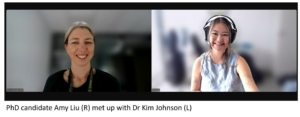 Hi Phytogen readers! I’m Amy, a second year PhD candidate investigating the regulation of nicotianamine biosynthesis genes in soybean, in the Plant Nutrition and Plant Cell Signalling Labs at the University of Melbourne. In my second year of my BSc, I was inspired by the wonders of plant genetics, and how we can use what we know about their environmental adaptations to develop better crops to battle ongoing worldwide food crises. I am particularly interested in biofortification – enhancement of the nutritional value of staple crops to better our diets. I have recently had the wonderful opportunity to interview an established plant scientist in this area – Dr Kim Johnson from La Trobe University – who currently works within the Institute for Sustainable Agriculture and Food. Kim started her career graduating with a PhD in plant cell glycoproteins from Melbourne University, then conducted postdoctoral research at the University of Edinburgh and the John Innes Centre. Afterwards, she moved back to Melbourne University as part of an ARC Centre of Excellence, researching cell wall integrity sensing. In 2018, Kim started her own lab at La Trobe University where she currently investigates a plethora of questions regarding changes in the cell wall in response to abiotic and biotic stress tolerance, flowering time regulation, and secondary metabolite production.
Hi Phytogen readers! I’m Amy, a second year PhD candidate investigating the regulation of nicotianamine biosynthesis genes in soybean, in the Plant Nutrition and Plant Cell Signalling Labs at the University of Melbourne. In my second year of my BSc, I was inspired by the wonders of plant genetics, and how we can use what we know about their environmental adaptations to develop better crops to battle ongoing worldwide food crises. I am particularly interested in biofortification – enhancement of the nutritional value of staple crops to better our diets. I have recently had the wonderful opportunity to interview an established plant scientist in this area – Dr Kim Johnson from La Trobe University – who currently works within the Institute for Sustainable Agriculture and Food. Kim started her career graduating with a PhD in plant cell glycoproteins from Melbourne University, then conducted postdoctoral research at the University of Edinburgh and the John Innes Centre. Afterwards, she moved back to Melbourne University as part of an ARC Centre of Excellence, researching cell wall integrity sensing. In 2018, Kim started her own lab at La Trobe University where she currently investigates a plethora of questions regarding changes in the cell wall in response to abiotic and biotic stress tolerance, flowering time regulation, and secondary metabolite production.
In our conversation, Kim and I touched on many topics, but two things stood out to me during our interview which will be our focus here. First was our shared ethos that collaborating with like-minded people in our areas of interest is a crucial part of staying engaged in our career paths. Working with wider general audiences, and students just starting out has been extremely rewarding for Kim, as she understands the importance of her community role in disseminating opportunities for keen future scientists. Furthermore, collaboration with other researchers has been a highpoint for Kim, the opportunity to work and converse with academics, and the privilege of being able to continuously learn new things has helped shape her journey. I have personally always likened the age-old adage, “it takes a village” to not only mean raising children but also in research careers, and it’s comforting to hear that still stands even after a PhD.
Second was our shared love for plants, I’ve always admired those that have found a passion and are able to make careers out of them. Kim is one of those people, with her endless love of learning and curiosity influencing her career journey, she has not lost her sense of awe regarding the incredible things that plants do. She notes that there is still so much we don’t know about our plant friends and endeavours to find out as much as she can (all the while juggling the responsibilities of running a lab, teaching at the University, and having a family!). Kim cites the driving forces for her career are knowing that her research can have an impact on the world, as well as the freedom of being able to ask and answer her own questions. These motivators for her career resonate greatly with me, I think back to my own experiences where I was fascinated by all the mechanisms plants employ for environmental adaptation and how we can use this to our advantage, and I am reminded that despite my own fears and anxiety over choosing this difficult career, it is an endeavour worth pursuing. Kim left me with some parting advice, for me and the rest of the future generation of plant scientists – be passionate, and make sure you enjoy what you’re doing in this life, it makes all the trials and tribulations that much more worth it.
Connect with Amy: https://www.linkedin.com/in/amy-liu-721479188/
Connect with Kim: https://www.linkedin.com/in/kim-johnson-18478577/
Dr Nipuni Peththa Thanthrige met Dr Rebecca Thistelwaite
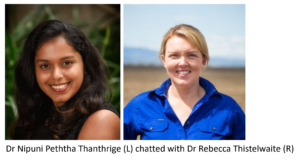 As a plant molecular biologist and postdoctoral research fellow at the Institute for Molecular Bioscience, University of Queensland, I am passionate about harnessing plant biotechnology for sustainable solutions. My research at the ARC Centre of Excellence for Innovations in Peptide and Protein Science focuses on using plants as biofactories to produce next-generation peptide-based medicines, including anti-malarial therapeutics. Through molecular farming, we aim to develop scalable plant-based systems for pharmaceutical and agricultural innovations, addressing both global health challenges and sustainable agriculture. My PhD research at Queensland University of Technology focused on improving the resilience and productivity of chickpea by identifying novel molecular mechanisms that enhance nodulation and abiotic stress tolerance without compromising yield. I have since expanded my expertise to include crop species such as sorghum, soybean, cowpea and mungbean in my postdoctoral work. My broader interests lie in molecular farming, genetic engineering, crop improvement and sustainable agriculture.
As a plant molecular biologist and postdoctoral research fellow at the Institute for Molecular Bioscience, University of Queensland, I am passionate about harnessing plant biotechnology for sustainable solutions. My research at the ARC Centre of Excellence for Innovations in Peptide and Protein Science focuses on using plants as biofactories to produce next-generation peptide-based medicines, including anti-malarial therapeutics. Through molecular farming, we aim to develop scalable plant-based systems for pharmaceutical and agricultural innovations, addressing both global health challenges and sustainable agriculture. My PhD research at Queensland University of Technology focused on improving the resilience and productivity of chickpea by identifying novel molecular mechanisms that enhance nodulation and abiotic stress tolerance without compromising yield. I have since expanded my expertise to include crop species such as sorghum, soybean, cowpea and mungbean in my postdoctoral work. My broader interests lie in molecular farming, genetic engineering, crop improvement and sustainable agriculture.
As part of this special issue, I had the pleasure of interviewing Dr. Rebecca Thistlethwaite, a dedicated plant breeder and research associate at the University of Sydney’s Plant Breeding Institute in Narrabri. With a PhD in wheat heat tolerance, Dr Thistlethwaite has devoted her career to developing climate-resilient crops. Her current research focuses on breeding wheat varieties that can withstand high temperatures and drought—an increasingly urgent challenge as global temperatures rise. She is deeply motivated by the goal of sustainable food production and values working closely with farmers and industry partners to ensure her research translates into real-world impact. She is particularly passionate about international collaborations, helping introduce hybrid wheat technologies to developing countries such as Pakistan, Bangladesh, and Ethiopia. She finds immense fulfillment in training scientists in these regions and seeing agricultural advancements take root. When asked about her greatest influences, Dr Thistlethwaite credits her family, who encouraged her to pursue a meaningful and sustainable career along with her supportive team, and the broader agricultural community. She also acknowledges the vital role of growers, whose challenges and insights drive her research forward. For Dr Thistlethwaite, the most rewarding part of her job is working with a diverse range of people. She enjoys learning from farmers, industry experts, and fellow researchers, emphasizing that knowledge exchange goes both ways. While she appreciates lab work, she prefers the field, where she can directly engage with industry stakeholders and witness the real-world impact of her research. Her advice to the next generation of scientists is to be confident in forging their own paths: “If you can’t follow in someone’s footsteps, do it yourself.” She encourages young researchers to ask questions, build strong networks, and develop the communication skills needed to translate research into real-world solutions. With her strong industry ties, international impact, and commitment to agricultural innovation, Dr Thistlethwaite is shaping the future of Australian plant science—driving innovation in wheat breeding and sustainable agriculture.
Connect with Nipuni: https://www.linkedin.com/in/nipuni-thanthrige-9939788a/
Connect with Rebecca: https://www.linkedin.com/in/rebecca-thistlethwaite-19426354/?originalSubdomain=au
Research Profiles: Women delivering plant science impact
What is plant science? Where does the discipline start and end? As an education professional and a crop scientist we are both connected to some degree in the core of plant science but our work also embraces other disciplines and scales from the classroom, lab, field and beyond. In our minds, plant science is a broad church and everyone is invited – the more the merrier as we seek to tackle some of the big challenges facing the world. Here we highlight the work, motivations and advice of some of the women in Australian plant science who inspire us. This includes people working directly in plant sciences, but also in a range of plant science-aligned areas. As the challenges facing the planet become more complex it is important that we look for opportunities to maximise the potential reach of our understanding of plants, their environmental impacts, and their transformative potential. We hope that you enjoy reading these profiles of amazing women shaping the future of plant science (and beyond) in Australia.
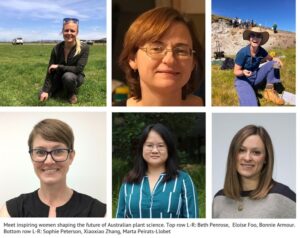
Beth Penrose is an Associate Professor at Charles Darwin University in the Northern Territory. Her work is focused on improving the sustainability and profitability of pasture and livestock systems in Australia and Asia.
What does your job involve? My job is super varied – I can have 5 meetings a day about different things! Generally, there’s a lot of mentoring and supervising research students, field work, lab work (though less so nowadays), meeting with industry to co-develop research, data analysis and writing papers and grants as well as presenting results to the public, industry and other scientists.
What motivates you? I wrote myself a ‘Research philosophy’ a few years ago – I like to do cool science that helps people/the world with kind people…. that’s what motivates me.
What do you see as the biggest opportunities for Australian plant science? Agriculture, forestry and aquaculture are such important industries in Australia – there’s so many opportunities to do awesome plant science in any of those industries. Also, Australia is a botanist’s dream – there are so many plants we know almost nothing about. The country is our oyster!
What is your favourite piece of advice for the next generation of Australian plant scientists? Think and read widely – most of the world’s biggest problems need multiple disciplines to solve them. Knowing a little about how physics or maths or chemistry or sociology (or any other discipline) works is increasingly important. And be kind, always be kind… in the end your kindness (or lack thereof) will be what you will be remembered for.
Connect with Beth: https://www.linkedin.com/in/beth-penrose-22541760/
Eloise Foo is a lab leader and lecturer in the School of Natural Sciences at the University of Tasmania.
What does your job involve? I teach undergraduate and diploma courses in plant development and genetics, lead research into how plants form beneficial symbioses with soil microbes, and mentor undergraduate, postgraduate and early career researchers to achieve their goals in this research area. Much of this research currently occurs in the ARC Centre of Excellence in Plant Success where I am a Chief Investigator. I also lead outreach activities to teach kids and wider community about the power of plants
What motivates you? I am motivated by curiosity and helping others. I love finding gaps in our understanding of the natural world and designing and carrying out experiments that help us understand the complex and beautiful interactions between plants and microbes. I also find a lot of satisfaction in mentoring students and researchers to build their skills and achieve goals. Seeing people grow in confidence and capacity and having an impact on the world of science and society is very fulfilling.
What do you see as the biggest opportunities for Australian plant science? Innovations in plant science will underpin some of the big challenges coming, such as meeting the demands of a changing climate and making agriculture more efficient and sustainable. Australia has exceptional research and translating that into innovative industry and policy is our biggest challenge but also our biggest opportunity. In Australia we have unique resources and environments, such as our wealth of crop wild relatives, that have a huge capacity to drive innovation in crop adaptation.
What is your favourite piece of advice for the next generation of Australian plant scientists? Follow your interests, seek out mentors that are excited to see you succeed and be a strong advocate for yourself. Be clear on your goals and be single minded in aiming for them- you may not always succeed but this will put you on a path to other great opportunities. The plant science community in Australia is an amazing, welcoming network and engaging with others with a generous attitude and spirit of collaboration should keep this alive for the next generation.
Connect with Eloise: https://www.linkedin.com/in/eloise-foo-6b576b2a0/
Bonnie Armour is the Carbon Farming and Soil Extension Officer for the Hills and Fleurieu Landscape Board, based in Adelaide.
What does your job involve? Part of my role involves engaging with farmers around my region and bringing them up to speed on the latest with carbon farming. There are a lot of misconceptions and negativity in the carbon farming space and some of the information is really important for farmers to understand and so my role is to deliver the cold, hard, facts. The other part of my role is soil extension, where I engage with farmers to find out what they need to know about in terms of soils. What’s the latest season’s hot spots, soil conditions, farmer’s best interests etc and how can I facilitate learning around this.
What motivates you? Sustainable agriculture is the only way forward in my opinion. Agriculture plays such a large part in the environment and so finding a balance between productivity and healthy environments in an already challenging climatic space is the key. Half of my family are farmers and the other half are beach bums, and that’s what sparked my passion between no-till and surfboards. I plan on dedicating my life to helping farmers in engaging ways and hopefully educating to the wider world the importance of sustainable agriculture. If a person walks out of the room, or field, learning just one thing, I’ve done a good job.
What do you see as the biggest opportunities for Australian plant science? I think linking climate projections and plant science together is an area farmers may really benefit from, i.e. plant breeding of varieties with higher tolerances to drought, lower-fertility and linking this with where the climate is heading. There is some really good research undertaken at Turretfield Research Centre now, where they’re looking at methane-reducing plant varieties (clovers and fresh-water plants that can be grown on dams in remote and regional areas). All signs point to the market focusing on accessing producers that may have lower carbon footprints, so research to help farmers with this external pressure, like these methane-reducing plants for livestock will only aid them if proven to reduce emissions and add to productivity. The key here is productivity! Also anything to do with soil health, as that’s the first link in the chain. Finding the most suitable companion plants for different soil types and environments, will help boost soil health and increase productivity.
What is your favourite piece of advice for the next generation of Australian plant scientists? Follow your nose and listen. That’s what I did. I started with PIRSA, in the Oat Breeding group while I was in uni. After a lecture from a scientist at the Genomic Research Facility, I then hunted her down and started interning, learning about gluten free plant varieties that were native and more drought tolerant. I then stumbled upon a group close to the research facility who worked with drones and also interned there. This landed me my first full-time job out of university, calculating carbon for planting projects. And listen. If you end up working in agriculture, always try to find a way to listen to farmers, the people on the ground. Often, decisions are made for them, without consulting or finding out what they know or need. And they’re full of knowledge and wisdom about the land. Listen, ask them questions, then listen again.
Connect with Bonnie: https://www.linkedin.com/in/bonnie-armour-74432219a/
Sophie Peterson is the Pacific Engagement Manager for Plant Biosecurity and the Director of Pacific Engagement and International Plant Health in the Plant Protection and Environmental Biosecurity Division in the Department of Agriculture, Fisheries and Forestry. When she is not traveling in the Pacific or globally supporting plant biosecurity she is based in Canberra, ACT.
What does your job involve? In my role I lead and support a team engaging with counterpart agriculture agencies across the Pacific on issues related to plant biosecurity, collaborate with governments across the globe to develop and implement international standards to support the safe trade of plant products and work closely with near neighbours on plant health survey activities.
What motivates you? The people I work with – plant biosecurity is all about preparedness and prevention, food security and preserving economic and cultural prosperity which are all critical motivators in their own right but for me, the people I work with who share the enthusiasm to improve all of these aspects of this multifaceted concept is what motivates me to work with them to make improvements.
What do you see as the biggest opportunities for Australian plant science? Australia is in the fortunate position to have the opportunity to use cutting edge technology to improve diagnostic detection methods, but many in our region and globally do not have these options available. Development of broad ranging “lower tech” diagnostic tools that are suitable for field use (including sea and airports) and less established diagnostic laboratories have the potential to enhance the ability of a large number of countries to improve their ability to check and test surveillance and inspection
What is your favourite piece of advice for the next generation of Australian plant scientists? Take opportunities! Don’t be afraid to take a step onto a different path if the chance arises – it does not have to be a “forever change” but will only expand your horizons.
Connect with Sophie: https://www.linkedin.com/in/sophie-peterson-756b0ba1/
Xiaoxiao Zhang is a Group Leader in the Research School of Chemistry at the Australian National University in Canberra. Her work uses synthetic biology to engineer novel disease resistance in cereal crops.
What is a typical day like in your job? My work day consists of varied tasks from designing and developing research projects, writing grants and manuscripts to teaching undergraduate courses and supervising students. I just recently started as a new PI and I really miss the time working in the lab and am keen to get back to that soonish.
What motivates you? What’s your favourite part of the job? My main motivation as a researcher is solving problems facing our world and people, such as food insecurity and infectious diseases. My favourite part of the job is interacting with enthusiastic and dedicated groups of people and working towards a common goal. They could be colleagues or students.
What do you see as the biggest opportunities for Australian plant science? Thanks to the hard work from everyone in the field, we have accumulated comprehensive knowledge of how plants work to produce energy and survive in challenging conditions. It is time to exploit this fundamental knowledge to engineer and future-proof our important crops.
What is your favourite piece of advice for the next generation of Australian plant scientists? Make sure you grab a coffee with your peers at least once a week and talk to each other!
Connect with Xiaoxiao: https://www.linkedin.com/in/xiaoxiao-zhang-a9a0b199/
Marta Peirats-Llobet is a Research Fellow at La Trobe University. Her research uses spatial technologies to understand seed development and germination.
What is a typical day like in your job? I start my day by checking my emails with a cup of “café con leche,” a coffee with milk that’s typical in Spain. My mornings are usually dedicated to experimental work, which could involve a variety of tasks such as growing seeds and checking plants growing, processing tissues for sectioning, checking some samples under the microscope or optimizing reagents for an experiment. After a social lunch with my colleagues in the communal kitchen at Agribio, I either return to writing if I have a manuscript in progress or head back to the lab to continue with experiments until it is time to go home for the day.
What motivates you? What’s your favorite part of the job? Curiosity is my biggest motivator. I’ve always been fascinated by understanding how things work, no matter how challenging they are. Problem-solving is another aspect of science that I find incredibly appealing. I enjoy discussing daily work-challenges with my colleagues because you never know what might spark the idea that makes an experiment successful.
What do you see as the biggest opportunities for Australian plant science? Australian plant science is a thriving sector with numerous funding opportunities, especially for applied sciences that enhance crop production, food nutrition, and plant security. Industries play a crucial role in powering Australian plant science by providing the extra financial support needed for our research projects.
What is your favorite piece of advice for the next generation of Australian plant scientists? “Be curious and don’t fear hard work.” A career in academic science can be particularly tough, but if you’re genuinely curious and willing to work hard, it can be incredibly rewarding. You’ll have the chance to meet people from various cultures, travel to conferences and research visits around the world, and if you work hard, make a meaningful impact.
Connect with Marta: https://x.com/peirats_marta
Global Plant Council Webinar
The Global Plant Council upcoming webinar session, titled “Winners and losers: Climate change effects on forests and crops“, will feature Professor Danielle Way, researcher at the Australian National University on April 11th at 9 am CEST.
Register here: https://us02web.zoom.us/webinar/register/WN_spce8CB6TuiafOAttYrqVQ
Editors’ note
It has been a real joy to guest edit this special issue of Phytogen. Through it we have had the opportunity to interact with a range of women shaping the future of plant science in Australia. This has demonstrated to us the excitement, passion and diversity in our community. It has also identified many common themes across the importance of collaboration with like-minded people, the encouragement to take risks and try things out for size, and most importantly the value of connection. We hope you enjoyed reading this special issue as much as we enjoyed editing it. Let’s all commit to embracing diversity and working together to shape a bright future for Australian plant science.
Beth & Alison, Guest Editors
Beth and Alison’s editorial work brought together an exceptional collection of women scientists that highlighted the passion, diversity, and collaborative spirit driving Australian plant science forward. Thank you, Beth and Alison. We would also like to thank all the scientists who contributed to this special issue.
Phytogen will return at the end of April, stay tuned!
February 2025 Phytogen
24 February 2025
Welcome to the February 2025 Phytogen!
In this issue, we formally welcome Professor Brent Kaiser as our new ASPS President and express our gratitude to Professor Martha Ludwig for her outstanding leadership for the last 2 years. Applications for several ASPS awards are now open. We also introduce the final student representatives of the Society for the year. This month our student contributor is Francis Kuang, a final-year PhD student at the University of Melbourne.
We welcome contributions from students and researcher at any time for publication in Phytogen and on our social media sites. Its free and a great way to give your research profile a boost and share your findings! Send your contribution to our editors Raz (razlin.azman@csiro.au) or Lucas (L.Auroux@latrobe.edu.au).
The new ASPS website is currently underway, and we need your contribution! Send us your plant science-related research photos to be featured on the new website. For copyright reasons, please do not send any images that have been published or that you are planning to publish. Images for consideration for the new website can be sent to Phytogen editors or Janet Wheeler.
ASPS Leadership Transition
 Thank you Prof Martha Ludwig!
Thank you Prof Martha Ludwig!
As we begin 2025, we bid farewell to Professor Martha Ludwig as ASPS President. During her tenure, Martha has been instrumental in strengthening the connections between states and territories, enhancing the visibility of Australian plant science research, and fostering a more inclusive scientific community. Her leadership has been particularly crucial in navigating the post-pandemic landscape and establishing robust hybrid conference formats that have increased accessibility and participation across the country. Martha will continue to contribute to the Society’s executive committee, ensuring a smooth transition and continued strategic guidance. We have asked Martha to say something about her time as ASPS President
Dear ASPS Members,
It was a pleasure for me to be President of our Society for the last two years – wow, did that time fly! High points of my time as President certainly include ASPS 2023 in Hobart and our hybrid meeting last year. The work of the ASPS membership in organising and attending these meetings was amazing and reflects the collegiality of our members and the strength of our society. Interactions with members of the ASPS Executive; Discipline, Diversity and Inclusion, and Student Representatives; and the Website and Communications Team are also high on the list of enjoyable experiences. I thank all for their enthusiasm, insights, input, time, and dedication to ASPS and plant science. I am pleased that conversations with Functional Plant Biology and Annals of Botany initiated several new and exciting opportunities for ASPS early- and mid-career researchers to extend and expand their research networks. Similarly, continued ASPS involvement with Science Technology Australia and Global Plant Council offers ASPS members chances to highlight and promote Australian plant science. It is great to see ASPS members engaging with these entities through webinar programs and sponsored events such as Science Meets Parliament. Developing closer ties between ASPS and the New Zealand Society of Plant Biology have also been enjoyable and hopefully will become stronger and perhaps expand to other Pacific Rim countries. I also look forward to the upcoming launch of the new ASPS website. From speaking and corresponding with ASPS members at all career stages, I believe the Society has a very positive future. The importance of plant science has never been greater. From climate change to food, fibre and fuel security, to synthetic biology, understanding how plants work is crucial. And as we know, fun! I will continue my involvement with the Society and welcome ideas on how ASPS can continue to support our membership and communities – just email me! I wish our new President, Brent Kaiser, all the best and I hope he enjoys the role as much as I did.
Best wishes to all,
Martha
Welcome, Professor Brent Kaiser!
We are delighted to welcome Professor Brent Kaiser as our new ASPS President.
Professor of Legume Biology,
School of Life and Environmental Sciences,
Director: ARC ITRH – Legumes for Sustainable Agriculture,
The University of Sydney (NSW)
Dr. Brent N. Kaiser is the Professor of Legume Biology and Molecular Genetics in the School of Life and Environmental Sciences at the University of Sydney, Australia. Brent is originally Canadian who migrated to Australia in 1994 to complete a PhD at the Australian National University (ANU) in Canberra under the supervision of Prof David Day. Prior to coming to Australia, he completed a BSc (Agriculture.) and MSc (Plant Physiology), at the University of Guelph in Guelph Ontario. He has worked as a postdoctoral fellow in France (Sophia Antipolis, Nice), Canada (UBC) and Australia (ANU). He arrived at the University of Sydney in 2015 and prior to that a teaching/research academic at the University of Adelaide (2003-14).
Professor Kaiser’s research focus is on nitrogen nutrition in plants. His research group examines the genetic and biochemical mechanisms by which plants access, assimilate and redistribute nitrogen across their developmental life cycle. The research involves the use of a range of model systems that include, symbiotic nitrogen-fixing legumes (Chickpea, Soybean, Medicago) and cereals (maize and wheat). Across both programs, the research aims to deliver genetic-based traits, which enhance nitrogen utilization, and which contributes to improved plant health, productivity and sustainable nitrogen use qualities of Australian cropping plants. He was the Director of the ARC Industrial Transformation Research Hub – Legumes for Sustainable Agriculture (2016-20) and recent director of the Sydney Institute of Agriculture (2022-24). Recent research activities have been focussed towards value-added outcomes for pulse crops (plant protein foods) and exploring fibre-based crop production systems for Australia and Namibia (Agave, Kenaf and industrial Hemp) for biofuels and enhanced plant-based fibres. Prof Kaiser is currently establishing an Australian farmer cooperative (Cobbedee) to establish a seed company that will commercialise new hybrid bread wheat technologies in Australia, a discovery initially developed by the University of Sydney’s, Plant Breeding Institute. Brent is the co-director (2024-) of the recently established International Joint Centre for Food Security and Sustainable Agriculture between the University of Sydney and Peking University (China).
Professor Kaiser has been a longstanding member of the Australian Society of Plant Scientists, which initiated during his PhD at the ANU (1995-99). He previously served as Treasurer of ASPS (2014-16). Brent is an avid plant scientist and plant admirer. An active home gardener in Camden NSW. Gardening became an interest, which kicked off early in his life, when maintaining private gardens back on Thetis Island, British Columbia, Canada – the starting point to this exciting life journey.
ASPS Award Applications now OPEN
We are pleased to announce that applications are now open for several prestigious ASPS awards: Jan Anderson Award, Peter Goldacre Award, Teaching and Outreach Award, and RN Robertson Travelling Fellowship. Winners of the Peter Goldacre, Jan Anderson and Teaching and Outreach Awards will present at the annual Conference later in the year
Application Deadline: 4th April 2025
For detailed information and application guidelines, see the following links
ASPS Teaching and Outreach Award
RN Robertson Travelling Fellowship
ASPS Student Representatives
Katie Schleyer, Flinders University, Adelaide (SA)
katie.schleyer@flinders.edu.au
“I am a PhD student with a background in molecular biology and an ever-growing collection of succulents. My project focuses on the alternative oxidase plant gene family, which encodes enzymes involved in respiration, and their potential role(s) in growth, reproduction, and stress tolerance in legumes.”
 Alistair Hockey, University of Western Australia (WA)
Alistair Hockey, University of Western Australia (WA)
alistair.hockey@research.uwa.edu.au
“I am a PhD candidate at the University of Western Australia deeply interested in genetic factors that mediate gene flow and drive evolutionary change. My research focuses on post-zygotic barriers in Cicer echinospermum P.H. Davis using cytogenetics, bioinformatics, and reproductive phenotyping to identify, characterize and validate these barriers.”
 Juel Datta, Centre for Agriculture and the Bioeconomy, QUT, Brisbane (Queensland)
Juel Datta, Centre for Agriculture and the Bioeconomy, QUT, Brisbane (Queensland)
“As a PhD researcher at Queensland University of Technology (QUT), my primary research focus is to interpret the mechanisms responsible for the prolonged phase transition period in citrus. To pursue this aim, I am utilizing advanced genomic approaches, which have enabled the identification of a few candidate genes potentiality may involve in flowering regulation. Additionally, I have improved a tissue culture protocol that will enhance the efficiency of citrus breeding programs.”
Student Contribution
PhD candidate,
School of Chemistry
and The Bio21 Molecular Science & Biotechnology Institute,
The University of Melbourne
francis.kuang@student.unimelb.edu.au | Linkedin | X
Francis is a final-year PhD student at the University of Melbourne, aspiring to become a plant enzymologist. Interestingly, his journey did not begin in plant science; instead, his background is in enzyme biochemistry. Enzyme, though small, possess remarkable catalytic power, driving essential biological processes. Inspired by these ‘small giants’, Francis became motived to explore how enzyme regulated biological functions.
To achieve this, his PhD research takes a multidisciplinary approach to investigating the regulation of ethylene biosynthesis through the ethylene-forming enzyme. His project is linkage of two expertise, as it co-supervised by Dr. Ivanhoe Leung (enzyme chemistry) and A. Prof. Mike Haydon (plant signalling).
“A multidisciplinary project is challenging but rewarding.” Multidisciplinary approaches often require a diverse skill set, but they ultimately provide a more comprehensive understanding of complex research questions.
Francis’s project initially focused on enzymes, where he discovered a unique regulatory mechanism in vitro. Through a multidisciplinary approach, he was able to further validate its biological regulation in a real plant system. Additionally, by integrating enzyme biochemistry with plant science, he can conduct high-throughput screening of inhibitors in vitro and then assess their biological effects in plants. Now, Francis is taking on a new challenge—starting from the plant side to explore how plants respond to environmental stresses and linking these responses to enzymatic biochemical processes.
With global warming accelerating, crops are increasingly vulnerable to climate change. Francis hopes his research can contribute to addressing this global challenge.
Editors’ note
Thank you for joining us for the February edition of Phytogen. March will be a special issue in celebration of Women in Plant Science, celebrating the achievements and contributions of women in plant science research across Australia. We look forward to sharing inspiring stories and highlighting groundbreaking work by women researchers in our field.
Feel free to send us your contributions for future issues and do not forget to submit your photos for the new ASPS website!
Newsletter written and edited by Lucas Auroux and Razlin Azman.
We thank Martha Ludwig and Brent Kaiser for their contribution and continued support of Phytogen. We also thank the student representatives for their contribution to this edition of Phytogen.
Invited contribution: student contribution by Francis Kuang.
January 2025 Phytogen
30 January 2025
Welcome to the first edition of Phytogen for 2025!
For this first edition of 2025 we are keeping things short and sweet – highlighting some of the new ASPS Student reps, and reports from the 2024 Conference.
We welcome contributions from students and researcher at any time for publication in Phytogen and on our social media sites. Its free and a great way to give your research profile a boost and share your findings! Send your contribution to our editors Raz (razlin.azman@csiro.au) or Lucas (L.Auroux@latrobe.edu.au).
The new ASPS website is currently underway, and we need your contribution! Send us your plant science-related research photos to be featured on the new website. For copyright reasons, please do not send any images that have been published or that you are planning to publish. Images for consideration for the new website can be sent to Phytogen editors or Janet Wheeler.
2025 ASPS Student reps
PhD student, Flinders University, Adelaide
alexandra.cunningham@flinders.edu.au
I am a first-year PhD student at Flinders University studying heat and drought tolerance in wheat, focusing on plant-soil-microbial interactions, stress biomarkers, and rhizosphere dynamics. In my spare time, I enjoy gardening and reading anything not from a peer-reviewed journal. I am looking forward to working with other student representatives and ASPS members throughout 2025!
Chamika Ratnayake (Queensland)
PhD student, Queensland University of Technology
chamilka.ratnayake@hdr.qut.edu.au
Chamilka Ratnayake is a PhD student at the Queensland University of Technology in the lab of Prof. Peter Waterhouse. Working with Nicotiana benthamiana – Australia’s native ‘lab rat’ plant – she’s pioneering research in metabolic pathway engineering. Beyond her research, Chamilka spearheads science communication, making complex plant biology accessible to everyone and inspiring the next generation of plant scientists.
 Lucas Auroux (VIC)
Lucas Auroux (VIC)
PhD student, La Trobe university
Lucas Auroux is a PhD candidate at La Trobe University. He investigates plant (epi)genomics, focusing on genome regulation during seed germination at single-cell resolution. Using advanced transcriptomics and spatial biology, his work aims to provide genetic tools to breeders to optimise germination in crops, addressing challenges in agriculture, climate change, and food security.
Winners’ Reports from 2024 ASPS Conference
NSW & ACT
Best Student Presentation
Nicole Bison,  University of British Columbia (visiting the Australian National University)
University of British Columbia (visiting the Australian National University)
Academic profile | The University of British Columbia interview | X: @Nicole Bison
I am a PhD student in Sean Michaletz’ lab at The University of British Columbia in Vancouver, Canada. I’m here visiting ANU in Adrienne Nicotra’s lab for a term and was so glad ASPS was holding their annual meeting during my visit. For me, this conference really had it all! The presenters were researchers whose work I’ve admired for years, and the atmosphere at the conference was fun and welcoming. I enjoyed sharing some new work and had some great discussion and feedback. Everything you could ask for! Thanks for having me ASPS!
Student Presentation Runner-up
 Xuan Hu, Australian National University
Xuan Hu, Australian National University
I am Xuan Hu, a fourth-year PhD student at Australian National University in Prof. Owen Atkin’s group, and I am honored to have received the Runner-Up Award for Best Student Presentation at the 2024 ASPS conference. The event provided a fantastic platform to share my research and connect with researchers across various disciplines in plant science. Engaging with experts and peers was inspiring and offered valuable feedback on my work. It was a pleasure to meet and exchange ideas with others passionate about advancing plant science. I am grateful to ASPS for this opportunity and look forward to future conferences.
Best Student Poster
 Edward Chaplin, University of Sydney
Edward Chaplin, University of Sydney
The University of Sydney interview
Attending the ASPS Conference in Sydney in November 2024 was a great experience, allowing me to network with fellow scientists and researchers from my discipline. The conference gave me an opportunity to hear about cutting-edge plant science being undertaken at other organisations as well as to present my own research which forms part of my PhD studies at the University of Sydney. My poster, for which I won the poster award, showcased the novel method I have developed to enable high-throughput phenotyping of stomatal physiology and anatomy traits under field conditions. I look forward to attending future ASPS events
VICTORIA
Best ECR Presentation
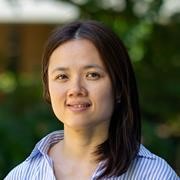 Lim Chee Liew, LaTrobe University
Lim Chee Liew, LaTrobe University
Lim Chee Liew Profile | La Trobe University
X: @LimCheeLiew
I recently had the privilege of attending 2024 ASPS conference, where I presented my research on seed germination. It was an incredible experience to engage with leading experts and peers, exchange ideas, and receive valuable feedback on my work. A highlight of the conference was being honoured with the Early Career Researcher (ECR) Presenter Award, recognizing my presentation and contribution to the field. This recognition motivates me to continue pursuing innovative research and collaboration. The event reinforced the importance of networking and staying abreast of cutting-edge developments, and I look forward to applying these insights to my future endeavours.
Best Student Presentation
Olivia Doolan, LaTrobe University
Olivia Doolan | La Trobe University Profile
ASPS24 was a hybrid conference with multiple hubs across Australia and New Zealand. I attended the Melbourne/Victoria hub, hosted by La Trobe University. The conference featured a diverse array of excellent talks, ranging from the potential use of tomatoes for pharmaceutical synthesis in space to the development of a single-cell resolution transcriptome atlas of germinating Arabidopsis. In the afternoon, ASPS awardees delivered insightful overviews of their careers and research areas. The day was filled with captivating talks, engaging posters, and valuable networking opportunities. I am honoured to have had the opportunity to present my work at such an excellent conference
Best Poster
 Thomas Cobbinah, La Trobe University
Thomas Cobbinah, La Trobe University
The presenters were from various fields of plant sciences with different academic levels from Principal Investigators through Early Career Researchers (ECR) to PhD and Master students. While enjoying the lunch well-crafted posters full of scientific information were staring at us, so we had to go around to enjoy what they had for us. Afterwards, the online and node award sessions followed where Dr Lim Chee Liew and I from Prof. Lewsey’s group won the Best Early Career Researcher and the Best Poster awards. At 5:00 pm, the meeting ended, and the organizers arranged for us to go to Bang Pop in South Wharf for the conference dinner. Enjoying a series of scientific discoveries and networking with people from various fields of science made the 2024 ASPS conference one of the unforgettable moments and to crown it with an award made me overwhelmed with joy.
WESTERN AUSTRALIA
Best Presentation
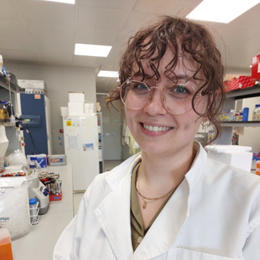 Samantha Norman, University of Western Australia
Samantha Norman, University of Western Australia
I have always enjoyed the ASPS conferences, and the 2024 hybrid conference was no exception. I really enjoyed the in person talks at my local WA node. There was great range of research topics presented, and everyone was very engaged resulting in some great discussions. I was lucky enough to be chosen to give a talk at the conference myself (my first ever conference presentation) and it was a joy to share my research with a room full of plant people. I am already looking forward to the next ASPS conference!
Best Poster
 Andrew Tuckey, University of Western Australia
Andrew Tuckey, University of Western Australia
X: @andy_tuckey
Attending my third ASPS meeting at UWA last November was a rewarding experience. The journey – a mere two flights of stairs – was a breeze compared to the intellectual heights we scaled during the conference. The program struck a great balance between insightful talks and engaging posters, and preparing a 3-minute flash talk was an enjoyable challenge. The conference dinner was a treat, with the melodic calls of frogs in the Sunken Garden adding a charming touch to the evening’s ambiance, alongside delicious food and great company. I’m looking forward to the next opportunity to reconnect with this community.
Editors’ note
We hope your year is off to a good start. Phytogen will be back in February. Remember to send us your research images for an opportunity to be featured on the new ASPS Website.
Newsletter written and edited by Lucas Auroux and Razlin Azman.
We thank the Student representatives and ASPS conference winners for their contribution to this edition of Phytogen
December 2024 Phytogen
16 December 2024
Welcome to the last edition of Phytogen for 2024!
For this final edition of the year, we take a look back at the local conference and the annual general meeting of the Society held at the end of last month. We welcome some new faces to the Society who will commence their roles in 2025. We also continue to spotlight our student members. This month we feature Yalin Liu, a first-year PhD student affiliated with the School of Biosciences at The University of Melbourne.
We welcome contributions from students and researcher at any time for publication in Phytogen. Its free and a great way to give your research profile a boost and share your findings! Send your contribution to our editors Raz (razlin.azman@csiro.au) or Lucas (L.Auroux@latrobe.edu.au).
2024 ASPS Local Conferences
The ASPS 2024 conference was a hybrid conference held concurrently across Australia and New Zealand at the end of last month. This event brought together plant scientists across Australia, with strong participation from NSW and ACT (117 attendees), QLD (64), SA (66), VIC (55), and WA (55). Colleagues from other states/territories joined online, making it a truly national gathering of ideas and research. It featured local meetings connected virtually for the ASPS and NZSPB award presentation session, where each award winner presented. This event brought together plant scientists to share research, collaborate, and strengthen connections within and across states and territories.
The ASPS would like to sincerely thank the local organising committees for making these events possible with the generous supports of our sponsors:
- National sponsors: Bioplatforms Australia, the ARC Centre of Excellence for Plant Success in Nature and Agriculture, and ThermoFisher Scientific.
- Award and lecture sponsors: Functional Plant Biology, The Annals of Botany Company, and Agrisera Antibodies.
- Local sponsors: the Australian Plant Phenomics Network (VIC, WA, NSW); the Australian Genome Research Facility (WA); Qiagen (WA), John Morris Group (WA), Licor Inc, the Western Sydney University School of Science and Hawkesbury Institute for the Environment (NSW); ARC Centre of Excellence for Plant Success in Nature and Agriculture and the Queensland University of Technology (QLD); Flinders University, The University of Adelaide, ARC Centre of Excellence for Plants for Space, Waite Research Institute and the South Australian Genomics Centre (SA).
Here are some winners for best talks and posters. Congratulations to all winners and thank you to all presenters for sharing your research at the conference. Your participation continues to make our annual conferences a success and a platform for plant scientists in Australia to share their research and form professional networks.
NSW & ACT
Best Student Presentation
University of British Columbia (visiting the Australian National University)
Academic profile | The University of British Columbia interview | X: @Nicole Bison
Student Presentation Runner-up
Australian National University
Best Student Poster
 Edward Chaplin
Edward Chaplin
University of Sydney
The University of Sydney interview
Student Poster Runner Up
Haoran Li
Australian National University
VICTORIA
Best ECR Presentation
 Lim Chee Liew
Lim Chee Liew
LaTrobe University
Lim Chee Liew Profile | La Trobe University
X: @LimCheeLiew
Best Student Presentation
Olivi Doolanm LaTrobe University
Olivia Doolan | La Trobe University Profile
Best Poster
 Thomas Cobbinah, La Trobe University
Thomas Cobbinah, La Trobe University
WESTERN AUSTRALIA
Best Presentation
 Samantha Norman
Samantha Norman
University of Western Australia
Best Poster
University of Western Australia
X: @andy_tuckey
ASPS 2024 annual general meeting
The Society’s Annual General Meeting was held on 29 November 2024. On behalf of the Society we would like to thank Professor Martha Ludwig whose term as President will end on 1 January 2025. Martha’s work strengthened the links between each state and profoundly enhanced the exhibition of plant science in Australia, thank you Marta. The President-Elect, Professor Brent Kaiser, will become the new President of the Society on 1 January 2025. Welcome Brent! Martha will continue to stay on the Society exec.
(L): Martha Ludwig ; (R): Brent Kaiser
Voting at the Annual General Meeting resulted in the election of new volunteers to fill the vacant positions from 2025:
Honorary secretary
Associate Professor Mary Byrne
University of Sydney
Academic profile | Lab Webpage
Associate Professor Mary Byrne is a plant geneticist studying plant development. Her group has made contributions to our understanding of genetic pathways that distinguish stem cell from differentiated cell fate in the plant shoot meristem, and to our understanding of genes and genetic pathways that determine leaf shape. She is a passionate teacher of undergraduate and graduate students studying plant science and genetics.
Discipline representatives
Welcome new discipline reps, and many thanks to outgoing discipline reps for their contribution to ASPS and Phytogen during the year.
Student representatives
Welcome to our new student representatives, representing VIC, QLD, WA and SA. We thank Zane Marks (U of Adelaide) for his effort and contribution to ASPS and Phytogen in 2024.
Student Contribution

Yalin Liu
PhD student, School of Biosciences, The University of Melbourne
yalliu1@student.unimelb.edu.au
Yalin Liu is a first-year PhD student in Mike Haydon’s Lab at the University of Melbourne, bringing a wealth of experience in molecular biology, biochemistry, and plant science.
Her research journey began during her master’s studies in the Constabel’s Lab at the University of Victoria, Canada, where she employed CRISPR knock-out techniques to study the transcriptional regulation of tannins in poplar trees. “This project deepened my understanding of gene regulation mechanisms in plants and provided me with extensive hands-on experience in wet lab” Yalin reflects. Her work was summarized in a peer-reviewed publication: Yalin Liu, Dawei Ma, C. Peter Constabel. CRISPR/Cas9 disruption of MYB134 and MYB115 in transgenic poplar leads to differential reduction of proanthocyanidin synthesis in roots and leaves. Plant and Cell Physiology, 2023, DOI:10.1093/pcp/pcad086. Following her MSc, Yalin further expanded her skill set by learning epigenetic techniques as a research assistant in Hong Kong.
Currently, Yalin’s PhD research focuses on unravelling the molecular mechanisms that control the circadian clock in wheat. Her work seeks to understand how plants integrate environmental signals to regulate developmental processes like leaf senescence, a crucial factor in crop productivity. “My passion lies in exploring how transcriptional regulation controls the circadian system to optimize plant growth and stress responses,” she explains. Her research promises to provide new insights into the role of the circadian clock in wheat, offering practical applications in crop improvement and sustainability.
Acknowledgements: Yalin Liu’s work is funded by the University of Melbourne and GRDC.
Editors’ note
We hope you had a great time at this year’s ASPS 2024 conference. Phytogen will be back at the end of January 2025. Until then, enjoy the time off!
Invited contribution: student contribution by Yalin Liu
Newsletter written and edited by Lucas Auroux and Razlin Azman.
November 2024 Phytogen
19 November 2024
Welcome to the November 2024 edition of Phytogen!
Our annual ASPS conference, incorporating the NZSPB conference is just around the corner! Registrations are still open for the conference and dinner. You can join in the conversation on the day on X using #asps2024. The ASPS Annual General Meeting will be held online on 29th November 2024.
This issue we highlight the other ASPS winners who will be presenting at the conference – Peter Crisp (Peter Goldacre Award), Ashley Jones & Benjamin Schwessinger (Outreach and Education winners), and Sergey Shabala (JG Wood Lecture). We also have a contribution from Dr. Kristine Crous, our Environmental & Ecophysiology Representative, and student contribution from Arka Dutta, PhD student at La Trobe University.
Expression of Interest are still open to be part of ASPS as council members and discipline reps.
We welcome contributions from students and researcher at any time for publication in Phytogen. Its free and a great way to give your research profile a boost and share your findings! Send your contribution to our editors Razlin (razlin.azman@csiro.au) or Lucas (L.Auroux@latrobe.edu.au).
2024 ASPS Award Winner Spotlight: Peter Goldacre Award
School of Agriculture and Food Sustainability, Faculty of Science, University of Queensland & Centre for Crop Science, Queensland Alliance for Agriculture and Food Innovation
Academic profile: UQ Profile
Lab webpage: Crsip lab
Social media (X): @Pete_crisp
Google Scholar: Peter Crisp
Dr Peter Crisp is a Group Leader and Senior Lecturer in the School of Agriculture and Food Sustainability at The University of Queensland. Peter’s research program is focused on crop functional genomics, epigenetics and biotechnology, and has significantly advanced our understanding of the contribution of epigenetics to heritable phenotypic variation in plants. His group has invented groundbreaking technologies for harnessing (epi)genetic variation and their discoveries have led to exciting new avenues for decoding genomes and for the rational engineering of gene regulation for trait improvement in plants. Having benefited immensely from brilliant mentors, Peter is passionate about training. He leads a budding group of talented students and researchers and is a Chief Investigator in the ARC Training Centre in Predictive Breeding and the International Research Training Group for Accelerating Crop Genetic Gain. Peter is also an affiliate of the Queensland Alliance for Agriculture and Food Innovation and the ARC Centre of Excellence for Plant Success in Nature and Agriculture.
Peter completed his PhD in functional genomics and intracellular signalling at the Australian National University under the supervision of Prof Barry Pogson; then from 2017 was a Postdoctoral Fellow at the University of Minnesota, USA under the mentorship of Prof Nathan Springer working on epigenomics in maize. Peter joined UQ in 2020 as a Group Leader and Lecturer Crop Biotechnology and genomics in the School of Agriculture and Food Science in the Plant Science cluster. At UQ Peter also held an ARC DECRA Fellowship followed by a UQ Amplify Fellowship.
2024 ASPS Award Winner Spotlight: Education and Outreach Award
Dr Ashley Jones
Research School of Biology, Australian National University
Academic profile: ANU Profile
Social media (X): @dnawhisperer
Ashley is a research scientist at the Australian National University, specialising in genomics and molecular biology. Key research areas are genome structure, transcriptomics, long non-coding RNAs, nucleic acid sequencing, SARS-CoV-2, bioinformatics and evolutionary biology.
Research School of Biology & ARC Training Centre for Future Crops Development
Australian National University
Academic profile: ANU Profile
Lab webpage: Schwessinger Lab page
Google Scholar: Benjamin Schwessinger
Benjamin has been working on plants and fungi in various aspects from signalling to genomics and from biochemistry to bioinformatics. He started off with Arabidopsis before moving to rice and Xanthomonas. His current work is focused on fungi called rusts with a focal point on the wheat stripe rust fungus Puccinia striiforims f. sp. tritici. Benjamin is fascinated by biology in general and by observing living systems in interaction.
Over the past seven years, Ashley and Benjamin have continuously innovated their teaching of the latest genomic analysis approaches in plant sciences, spearheading the establishment of Oxford Nanopore sequencing across Australia and in the class room. Their impact in plant science teaching and beyond has been significant, influencing multiple sectors including universities, industries, government, and communities. Key to these achievements, is that they pursue a highly integrative approach to teaching from wet lab protocol development to dry lab analysis pipeline sharing. In addition, we focus on development of wider scientific communities, as we share teaching materials and protocols online via Protocols.io.
2024 ASPS Award Winner Spotlight: JG Wood Lecture
School of Biological Sciences, University of Western Australia
Academic profile: UWA Profile
Google Scholar: Sergey Shabala
Sergey is the Chair in Plant Physiology at the University of Western Australia. He is also a Distinguished Professor and a Director of the International Research Centre for Environmental Membrane Biology at Foshan University in China. His area of expertise is stress physiology and membrane transport in plants. His work is aimed at revealing and quantifying the role of specific ion transporters in plant adaptive responses to salinity, waterlogging, osmotic stress, chilling, acidity, elicitors and oxidative stress, as well as to understand the signalling cascades mediating plant-environment interactions. Professor Shabala revolutionised the once mysterious field of plant stress biology by introducing and applying ‘MIFE’, a trademarked non-invasive tool for studying the adaptive responses of plant cells and tissues to a large number of stresses.
Be part of ASPS!
Nominations are now accepted for the following positions in ASPS. You can nominate using this form ASPS-Council-Nomination-Form-5, and send to Janet Wheeler (Janet.Wheeler@latrobe.edu.au). The positions will remain open until filled.
- ASPS secretary
- Education and Outreach
- Diversity and Inclusion
- Student representative
Discipline leads:
- Cell Biology Representative
- Plant-Microbe Interactions Representative
Environmental & Ecophysiology Representative
Institute for Molecular Bioscience, Hawkesbury Institute for the Environment
Western Sydney University
Academic profile: Western Sydney Uni profile
Lab webpage: Crous Lab
Google Scholar: Kristine Crous
The 2019-2020 bushfire season was one of the worst in history with about 24 million hectares burnt across the country. This bushfire season was preceded by a strong drought lasting for several years and resulting in crisp, dry leaves underfoot in the forest, even in rainforests. We now call this season the “Tinderbox drought” as the long drought prepared many landscapes for easy ignition, including in rainforests.
Rainforests usually don’t burn due to high moisture levels, but large parts of world heritage-listed Gondwanan rainforests did in 2019-2020. This event opened up a unique opportunity for researchers to investigate how resilient rainforests are to bushfire. After the initial resprouting and reseeding phase, there was cautious optimism that rainforest were moving on and recovering. However, these rainforests did not evolve with fire and have thin bark.
My team at Western Sydney University set up a contrast of control (no burn) and burned plots in Northern NSW three years after the fires to investigate the longer-term effects of bushfire on rainforest species. These plots are rich and diverse in species, including both the foundation species as well as some threatened species. Many of these rainforest species have ancient Gondwanan lineages, going back 40-50 million years to the time when Australia broke off from Antarctica. Rainforest species responses to fire include resprouting, re-seeding, and mortality, with overall slower recovery rates compared to other ecological communities (e.g. eucalypt-dominated forests).
Even five years after the fire, there is a vast contrast between burned and control plots. Charcoal on the stems reveal the scars of the burn (Fig. 1) and the open canopy of the burned plots makes you feel exposed to the sun, unusual in normally closed-canopy rainforests. Some trees have no leaves at all, exposed cracks in their bark or show signs of fungal attack on their stems (Fig. 2). These are signs of a slow death. Trees are still dying years after the burn with stem fall regularly occurring.
Fig 1 (L: Charcoal traces on fallen trunk in the aftermath of fires; R: Fire scars left behind. Photo credits: Amy Smart)
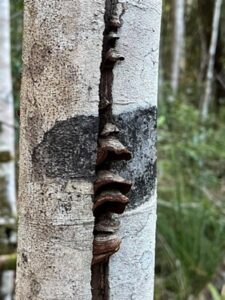 Fig 2: Fungal attack after fire (photo credit: David Ellsworth).
Fig 2: Fungal attack after fire (photo credit: David Ellsworth).
The capacity to recover ecosystem productivity and reinstate nutrient cycling is important to the overall long-term resilience of rainforests. Our team is monitoring aboveground productivity in burned and control plots. This involves stem growth via dendrometer bands (Fig. 3), leaf canopy increment via canopy photos and leaf litter fall (Fig. 4) as a turnover component. Nutrient dynamics are also contrasted in burned and control plots including nutrient resorption and soil nutrients to investigate how nutrients influence rainforest recovery after fire. Plant traits such as bark thickness, vulnerability to embolism and heat tolerance are also measured. While initial green resprouting may have been seen as ‘recovery’, bushfires may push rainforests to an alternative vegetation type and eliminate habitat for threatened and endangered species. It is clear that this ecosystem still has a long trajectory towards restoring what was here before with ongoing impacts even five years after fire.
This project is still ongoing and funded by the Hermon Slade Foundation. We are hoping to gain insights into recovery trajectory of rainforests after fire on two different soil types. A deeper understanding of post-fire responses and aboveground productivity is crucial to assess the long-term resilience and recovery of rainforest species and improve biodiversity conservation strategies after fire.
(L)Fig 3 Dendrometer band on tree, photo credit: Amy Smart; (R) Fig 4: Leaf litter trap in the woods, photo credit: Amy Smart
Student Contribution
Arka Dutta
PhD candidate, La Trobe Institute for Sustainable Agriculture and Food (LISAF – AgriBio research centre)
Department of Animal, Plant and Soil Sciences, School of Agriculture, Biomedicine and Environment, La Trobe University
Academic profile: Arka Dutta profile | La Trobe University
Motivated by an intrinsic curiosity, Arka Dutta’s research path has led him internationally to La Trobe University, where he is currently a 2nd year PhD student. “As a child, I was enormously influenced by Madam Curie and Rosalind Franklin’s biographies, and wanted to pursue a career in fundamental science. Growing up, I spent a considerable time with my father, a mathematics professor who inadvertently drew me into the field ofscience. Tackling one problem through multiple approaches and arriving at a conclusion with robust scientific reasoning was what I liked the most about doing science.
Throughout my entire academic career, I had the opportunity to carry out internships in different laboratories and I realized that performing experiments, troubleshooting them, and asking logical questions in a meaningful way is a passion more than anything”.
“My key scientific interest lies in understanding the intricate networks in plants that regulate nutrient uptake, utilization, and reallocation, with the goal of engineering crops to enhance their nutritional immunity and resilience against diverse stress conditions”
Arka’s PhD research question focuses on understanding the adaptive strategies plant use to modulate the cellular phosphate sensors (SPXs) proteins, to regulate the homeostasis of phosphate and nitrate signalling in plants.
During his PhD, Arka had the opportunity to be a co-author in some of the most renowned peer-reviewed plant Journals. Here is a budding list of publication from Arka, that highlights his research contributions:
Balancing act: The dynamic relationship between nutrient availability and plant defence
The Plant Journal (2024)
DOI: https://doi.org/10.1111/tpj.17098
The fnr-like mutants confer isoxaben tolerance by initiating mitochondrial retrograde signalling
Plant Biotechnology Journal12 pages Wiley-Blackwell
DOI: 10.1111/pbi.14421
Phosphate starvation regulates cellulose synthesis to modify root growth
Plant Physiology194(2):1204-1217 (14 pages) Oxford University Press
Editors’ note
Phytogen will be back for our next issue for the 2024 ASPS conference wrap up
We look forward to see you all in person and online for the conference.
October 2024 Phytogen
20 October 2024
Welcome to the October 2024 edition of Phytogen!
Early registration and abstract submissions for the ASPS conference closes on 30th October. Register and submit an abstract for your local ASPS hybrid conference HERE
This issue we highlight A/Prof Jenny Mortimer, recipient of the 2024 Jan Anderson Award. We also have a contribution from Dr. Nipuni Peththa Thanthrige, our Genetics & Molecular Biology Representative, student contribution from Ben Wee, a final year PhD student in ARC Medicinal Agriculture Hub at La Trobe University, and we round up with the final cohort of student awardees of the travel grant of the International Plant and Molecular Biology (IPMB) conference held in Cairns in June.
Expression of Interest are still open to be part of ASPS as council members and discipline reps.
We welcome contributions from students and researcher at any time for publication in Phytogen. Its free and a great way to give your research profile a boost and share your findings! Send your contribution to our editors Razlin (razlin.azman@csiro.au) or Lucas (L.Auroux@latrobe.edu.au).
2024 ASPS Award Winner Spotlight: Jan Anderson Award
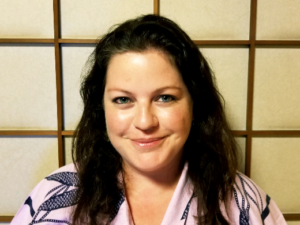 A/Prof Jenny Mortimer
A/Prof Jenny Mortimer
University of Adelaide
Academic profile : UoA profile
Lab webpage: mortimerlab.org/.
Social media (Twitter) Jenny_Mortimer1
Google Scholar Jenny Mortimer – Google Scholar
The editorial team congratulates Jenny Mortimer on her Jan Anderson Award. Jenny is an Associate Professor of Plant Synthetic Biology in the School of Agriculture, Food and Wine at the University of Adelaide (UoA), Australia, where she is also Deputy Director (Interim) of the Waite Research Institute. She is Chief Investigator (CI) and UoA node leader of the ARC Centre of Excellence Plants for Space (P4S). She is also an Affiliate Staff Scientist at Lawrence Berkeley National Laboratory, USA, and a Director of Plant Systems Biology at the Joint BioEnergy Institute, USA. After completing her PhD at Cambridge University, UK, she began exploring how engineering the plant cell wall could deliver sustainable and economically viable biofuels: first as a postdoc in Cambridge, then as a research fellow at RIKEN Japan, before joining Berkeley Lab in 2014, and Adelaide in 2021. Her team’s research focuses on understanding and manipulating plant cell metabolism, with a focus on complex glycosylation. The goal is to develop knowledge and crops which contribute to a sustainable and renewable bioeconomy.
At Adelaide, her group is using synthetic biology to develop new crops for food and materials production in controlled growth environments – including for Space settlement (P4S), applying new agricultural biotechnologies to develop resilient field crops as a CI in the ARC Training Centre for Future Crops Development, and developing Australian feedstocks for sustainable jet fuel as a CI in the ARC Research Hub for Engineering Plants to Replace Fossil Carbon. She collaborates extensively internationally, and projects include a UK Space Agency funded project to develop a plant growth facility for Axiom Station, and a NASA funded project to develop a payload for Artemis III, the mission that will return humans to the surface of the moon. She was selected as a World Economic Forum Young Scientist (2016/17), where she contributed to the WEF Code of Ethics for Researchers (widgets.weforum.org/coe), and she is an editor for the society journals Plant Cell Physiology and Plant Journal.
Editors’ note: Jan Anderson award is in honour of Joan (Jan) Mary Anderson FAA FRS FDhc (Umeå), an internationally acclaimed plant biologist renowned for her discoveries on the organization of the intricate membrane structures that carry out solar energy conversion in cells of green plants. Jan’s experiments and insights changed the way we think about the light reactions of photosynthesis. Her research career spanned some 55 years, mostly at the Division of Plant Industry CSIRO Canberra (1961-97) and then in the Research School of Biological Sciences at the Australian National University. Jan was a passionate and creative female scientist who was well ahead of her time. She was an inspiration to young researchers, for whom her enthusiasm and curiosity were infectious. Professor Jan Anderson died on 28 August 2015 after a short illness. In recognition of her life and achievements in photosynthesis research as a pioneering female scientist, this award will acknowledge talented female plant science researchers.
Be part of ASPS!
Nominations are now accepted for the following positions in ASPS. You can nominate using this form ASPS-Council-Nomination-Form-5, and send to Janet Wheeler (Janet.Wheeler@latrobe.edu.au). The positions will remain open until filled.
- ASPS secretary
- Education and Outreach
- Diversity and Inclusion
- Student representative
Discipline leads:
- Cell Biology Representative
- Plant-Microbe Interactions Representative
Genetics and Molecular Biology Representative
 Dr Nipuni Peththa Thanthrige
Dr Nipuni Peththa Thanthrige
Institute for Molecular Bioscience, The University of Queensland, Brisbane (Queensland)
Academic profile: UQ profile| The ARC Centre of Excellence for Innovations in Peptide and Protein Science (CIPPS)
Nipuni is a postdoctoral research fellow at the Institute for Molecular Bioscience, The University of Queensland, and is also affiliated with the ARC Centre of Excellence for Innovations in Peptide and Protein Science. Her research interests include plant molecular farming, abiotic stress tolerance, programmed cell death, and plant-microbe symbiosis. Currently, she works in Professor David Craik’s lab, where she uses Nicotiana benthamiana and cowpea as platforms for producing antimalarial peptides in plants, aiming to develop plant-based treatments for malaria. The Craik group achieved a significant breakthrough fifteen years ago with the discovery of cyclotides—ultra-stable peptides with a unique structure resistant to digestive breakdown. This discovery has opened the door to the development of a new generation of targeted, potent drugs and agrichemicals. Nipuni’s work applies this innovation to the production of antimalarial peptides in plants, pushing the boundaries of plant-based therapeutic production.
Before joining Craik’s group, Nipuni worked at the Queensland Alliance for Agriculture and Food Innovation (QAAFI) on a GRDC-funded sorghum project aimed at improving grain quality. Her experience in both fundamental and applied research has shaped her multifaceted approach to plant science.
Nipuni joined UQ in 2022 after completing her PhD at Queensland University of Technology (QUT). Her doctoral research focused on understanding the molecular mechanisms of co-chaperone Arabidopsis thaliana Bcl-2-associated athanogene 4 (BAG4)-mediated stress tolerance. Her findings have been published in high-impact journals such as Trends in Plant Science, Frontiers in Plant Science, and Scientific Reports, with another paper currently under review in PNAS. In 2022, she won the People’s Choice Award at the Falling Walls Brisbane Pitching Competition and was a finalist in the national competition.
Editor’s note: you can access Dr Nipuni Peththa Thanthrige Falling Walls Brisbane pitching competition where she received the people’s choice award HERE.
Additionally, Nipuni received the New Phytologist Next Generation Scientists travel grant in 2023, allowing her to present her research at the New Phytologist Next Generation Scientists Symposium in Singapore.
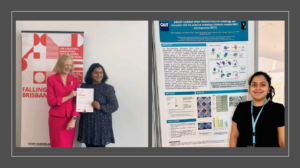 Image (L to R): Nipuni receiving the People’s choice award at Falling Walls (Brisbane 2022); Nipuni presenting her research at the New Phytologist Next Generation Scientists Symposium (Singapore (2023)
Image (L to R): Nipuni receiving the People’s choice award at Falling Walls (Brisbane 2022); Nipuni presenting her research at the New Phytologist Next Generation Scientists Symposium (Singapore (2023)
Beyond her research, Nipuni is passionate about teaching and mentoring the next generation of scientists. She is currently co-supervising two PhD students and has delivered some plant biology lectures in plant biology courses at QUT. During her PhD, she served as the lead tutor for three biology course units. Her dedication to education is reflected in outstanding student feedback, and her enthusiasm for mentoring is evident through her continued efforts to share knowledge and expertise. Her academic journey was recently featured in Careers with STEM magazine. Nipuni was a member of the ASPS organizing committee in 2023 and is now chairing the upcoming ASPS QLD Node Conference in November 2024. As the Genetics and Molecular Biology Representative for ASPS, she is excited to promote plant molecular biology and biotechnology research both in Australia and globally, believing that ASPS provides an excellent platform for advancing this mission.
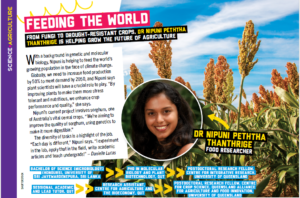
Image: Careers with STEM magazine
Student Contribution
 Benjamin Wee Yang
Benjamin Wee Yang
PhD candidate, ARC Industrial Transformation Research Hub for Medicinal Agriculture, La Trobe Institute for Sustainable Agriculture & Food (LISAF – AgriBio research center), Department of Animal, Plant and Soil Sciences, School of Agriculture, Biomedicine and Environment, La Trobe University
Benjamin Wee Yang Profile | La Trobe University | Linkedin
With extensive experience in the horticultural industry, Benjamin is now in the final year of his PhD at La Trobe University. “My professional background in horticulture has shaped my focus on delivering practical research outcomes for the growers, particularly for high-value crops like medicinal plants. There’s a significant opportunity to influence cultivation practices towards more sustainable targets, given the relative infancy of the industry” he explains.
“Following my time in industry, I found the ideal opportunity with the ARC Medicinal Agriculture Hub, based at AgriBio, La Trobe University—a leading centre for agricultural biosciences. And after these three years, I can honestly say it’s been one of the best decisions I’ve made. The Hub brings together a wealth of expertise, and the leadership has been incredibly supportive in helping us achieve our research goals. Being part of the Phenotyping and Cultivation team has also added an invaluable interdisciplinary dimension to my work, under the excellent guidance of Dr Oliver Berkowitz and Dr Ricarda Jost, respectively.”
Benjamin’s PhD research focuses on nutrient use in hemp and drug type Cannabis sativa. “By integrating physiological, metabolomic and transcriptomic data from a carefully controlled study system, my objective is to identify key markers for efficient nutrient use in this multi-purpose crop,” he says. His research aims to provide actionable insights that will promote more sustainable agricultural practices and enhance crop performance in commercial production systems. Read his latest peer reviewed article on the subject HERE
Acknowledgements: The work was funded by the ARC ITRH for Medicinal Agriculture (IH180100006) and involved the industry partners Photon Systems Instruments and Cann Group.
Student travel grant awardees report – IBMP Cairns 2024
 Happy Singh – UWS (NSW)
Happy Singh – UWS (NSW)
LinkedIn: Happy Singh
I, Happy, PhD candidate at Hawkesbury Institute of the Environment of Western Sydney University (Australia) thrilled to share my wonderful experience at the International Plant Molecular Biology Conference (2024) held in Cairns this year. First and foremost, I would like to extend my gratitude to the IPMB committee for giving me the opportunity to present a portion of my research and for selecting me for the Travel Grant Award. It was an incredible experience to learn about the groundbreaking work being conducted by renowned researchers and scientists in their respective fields. I presented a poster on my PhD work titled “Cellular Vibration by Sound Waves Disrupts Poricidal Cone Trichomes to Boost Tomato Pollination, Seed Set, and Fruit Size.” I had the opportunity to interact with numerous researchers and scientists, engaging in discussions to understand the significance of sound waves in agriculture. Additionally, I received valuable suggestions to improve the quality of my research. Overall, presenting my poster at IPMB was a great experience, and I learned a lot about how the scientific community operates. The plenary sessions were particularly outstanding, both at the beginning and the end of the conference, showcasing the meticulous effort put in by the organizing committee. It was also a fantastic opportunity to connect with students and researchers from all over the world, sharing diverse scientific perspectives and areas of interest. Overall, it was an incredible experience to be part of such a remarkable conference.
Zuba Ahmed – QUT (QLD)
LinkedIn: Zuba Ahmed
 Attending the IPMB 2024 conference in Cairns was a wonderful experience. I was able to build my network and learn about the exciting advances in plant science from around the world. It was my first time presenting my research at an international conference, and I am thankful for ASPS for providing travel funding to attend. The conference program was diverse with many opportunities to connect with other PhD students and researchers. I especially enjoyed the plenary speaker sessions held throughout the conference and the invited speakers were a great source of motivation for my own work and career development.
Attending the IPMB 2024 conference in Cairns was a wonderful experience. I was able to build my network and learn about the exciting advances in plant science from around the world. It was my first time presenting my research at an international conference, and I am thankful for ASPS for providing travel funding to attend. The conference program was diverse with many opportunities to connect with other PhD students and researchers. I especially enjoyed the plenary speaker sessions held throughout the conference and the invited speakers were a great source of motivation for my own work and career development.
Editor’s note: Zuba worked with an indigenous artist to create a Nicotiana benthamiana t-shirt based on her research
Khaksefidi Reyhaneh – Uoa (SA)
Bio: Researcher Profile – The University of Adelaide | LinkedIn: Khaksefidi Reyhaneh
Receiving the IPMB travel award from the Australian Society of Plant Scientists was a significant honour, and I thoroughly enjoyed the conference both scientifically and socially. This award enabled me to attend the 13th International Congress on Plant Molecular Biology held in Cairns. Attending this conference in Australia was a highlight of my PhD journey as I had the opportunity to network with researchers from around the world. The sessions were incredibly informative, offering insights into the latest research and developments in plant science. I had the chance to present my poster titled ‘Exploring MicroRNA-Mediated Regulation in Barley Inflorescence Development,’ which received valuable feedback from peers and experts in the field. Attending sessions expanded my knowledge and inspired new ideas for my future research. Overall, the conference was a remarkable experience, and I am grateful to ASPS for making it possible.
Editors’ note
Phytogen will be back for our next issue in mid-November, JUST before the 2024 conference happens. Don’t forget to register!
Stay spooky, green thumbs
September Phytogen
30 September 2024
Welcome to the September 2024 edition of Phytogen!
Welcome Spring! As we are approaching the warmer months, our ASPS conference is getting closer (To register and submit an abstract for your local ASPS hybrid conference HERE).
This issue we congratulate the 2024 ASPS winners and publication by our members. We have a contribution from Pr. Lucas Cernusak, our Education Representative, and a research contribution from Dr. Francine Perrine-Walker. Also included in this issue is 2023 R.N Robertson Travelling Fellowship report. We also continue to highlight our student awardees of the travel grant of the International Plant and Molecular Biology (IPMB) conference held in Cairns in June.
There are several opportunities to be part of ASPS.
We welcome contributions from students and researcher at any time for publication in Phytogen. Its free and a great way to give your research profile a boost and share your findings! Send your contribution to our editors Razlin (razlin.azman@csiro.au) or Lucas (L.Auroux@latrobe.edu.au).
Celebrating achievements
Congratulations to the winners of the 2024 ASPS award who will be presenting at the ASPS hybrid conference happening in late November.
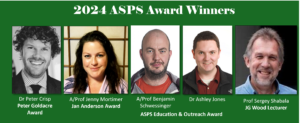
Peter Goldacre Award: Dr Peter Crisp (UQ profile | X: pete_crisp)
Jan Anderson Award: Assoc Prof Jenny Mortimer (UoA profile | X: Jenny_Mortimer1 )
ASPS Education and Outreach Award: Dr Ashley Jones (ANU profile |X: dnawhisperer ) & Assoc Prof Benjamin Schwessinger (ANU profile | X: @schwessinger | Research Group)
JG Wood Lecturer: Prof Sergey Shabala (UWA profile)
In addition, congratulations to ASPS member Dr Lim Chee Liew and colleagues (LaTrobe Uni) for their publication in Nature Plants and the front cover feature.
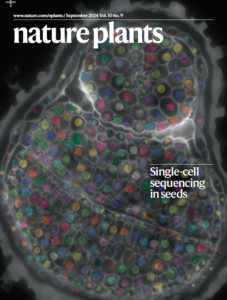
Image by Lucas Auroux and Lim Chee Lim
Be part of ASPS!
Nominations are now accepted for the following positions in ASPS. Please reach out to Janet Wheeler (Janet.Wheeler@latrobe.edu.au) if you are interested in getting involved in these roles.
- ASPS secretary
- Education and Outreach
- Diversity and Inclusion
- Student representative
Discipline leads:
- Cell Biology Representative
- Plant-Microbe Interactions Representative
Education Representative Update
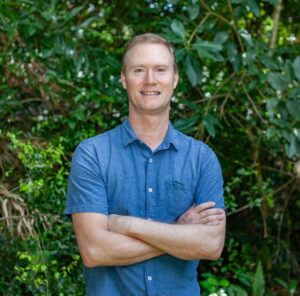 Pr. Lucas Cernusak, College of Science and Engineering, James Cook University, Cairns Campus (Queensland)
Pr. Lucas Cernusak, College of Science and Engineering, James Cook University, Cairns Campus (Queensland)
Bio: Pr. Lucas Cernusak | James Cook University
Lucas Cernusak is a Professor of Plant Science at James Cook University, Cairns. His main research interest is to understand the environmental and biological controls on carbon dioxide and water vapour exchange between leaves and the atmosphere. He is also interested in improving the interpretation of stable isotope signals in plant organic material, to better understand how leaf gas exchange has responded to global climate change through time and how it varies across ecological gradients. He and his lab group at James Cook University are especially interested in understanding these processes in tropical trees and responses of tropical rainforests to climate change and rising atmospheric CO2.
Lucas joined James Cook university in 2013 as an ARC Future Fellow, after having completed his PhD in the Research School of Biology at the Australian National University, after which he did postdoctoral research at the Smithsonian Tropical Research Institute in the Republic of Panama and Charles Darwin University in Darwin, Northern Territory. He has been a member of the ASPS since beginning his PhD in 2000. Over his career, Lucas has published more than 150 peer-reviewed journal articles and book chapters.
In addition to his research, Lucas is also passionate about plant science education, outreach, and engagement. Lucas has made substantial contributions to the academic community through mentorship and teaching. He has supervised numerous PhD students to completion, helping his students win research grants and publish their research under his guidance. His dedication to teaching is reflected in exemplary student feedback scores, and he continually strives to make a lasting impact in the classroom.
Looking ahead, Lucas is excited to have been elected to the role of Plant Science Education Representative in the ASPS, and to have the opportunity to promote plant science education in Australia and internationally. He strongly believes that the ASPS provides an ideal vehicle for doing this.
R.N Travel Fellowship Report
Exploring Genome Structure in Cicer echinospermum through Oligo-FISH Chromosome Barcoding

Report by: Alistair Hockey
PhD candidate
The UWA School of Agriculture and Environment, University of Western Australia
In a world of increasing digitalisation, it’s easy to lose touch with the physical components that make up our world. An ongoing reliance on bioinformatic analysis in the fields of genetics and genomics has led to the inference of genetic factors and effects with little to no independent physical evidence. Such is the case with the study of genome structure diversity, a field founded in cytogenetics, now dominated by genome sequence analysis and inference. Genome structure is a key determinant of gene flow dynamics within and between species, with differences in structure often resulting in barriers to gene flow. With the support of the R.N. Robertson Travelling Fellowship, I set out to identify, validate and characterise genome structure diversity in chickpea (Cicer arietinum ssp. arietinum L.) and Cicer echinospermum P.H. Davis through, oligo-FISH chromosome barcoding, a modern cytogenetic approach.

Image: Dolní náměstí, Olomouc city centre
My PhD project is focused on uncovering post-zygotic barriers to gene flow in Cicer echinospermum to better understand the species coherence and relationship to closely related sympatric species. Cicer echinospermum is the only known annual Cicer species (2n = 2x = 16) capable of hybridizing with chickpea to produce semi-fertile hybrids. Moreover, the genetic diversity within C. echinospermum far exceeds that of domesticated chickpea (108 times greater!) (von Wettberg et al., 2018). Introducing novel genetic material to increase genome-wide diversity in chickpea could be beneficial for both short-term and long-term crop improvement. However, barriers to gene flow between the two species exist, large genome structure variation chief among them. Karyotypic variation between the two species was first discovered by Ladizinsky and Adler (1976), who observed meiotic chromosome pairing aberrations in F1 hybrids and concluded the two species differed by a reciprocal translocation. Since then, most identification and characterization of large genome structural variations (> 1 Mbp) between the two species have been through bioinformatic analyses (e.g., pangenomes).
In my PhD project, I am using both bioinformatic and cytogenetic approaches to identify, validate, and characterize genome structure variation within C. echinospermum. Olomouc, a Czech university city in the heart of Moravia, is known for its baroque-style architecture and is home to the Institute of Experimental Botany (UEB). The Hribova Lab at UEB developed an oligo-FISH barcoding system for chickpea. This modern cytogenetic approach allows for the physical characterization of karyotypic diversity in chickpea. Thanks to a collaboration between my primary supervisor Dr. Judith Lichtenzveig and Prof. Jaroslav Dolezel, I had the opportunity to spend June 2024 working with the Hribova Lab in Olomouc to test the chickpea barcoding system on C. echinospermum. Additionally, I attended the EMBO Plant Genome Stability and Change 2024 workshop in Olomouc and presented a seminar on my current PhD findings.
We planned two experiments to produce mitotic chromosome spreads from meristematic root tips and label chromosomes through oligo-FISH barcoding. One experiment involved cell cycle synchronization to prepare mitotic chromosomes at metaphase I, while the other used a simpler protocol to halt cell cycle continuation in meristematic root tips. Both experiments then followed the same protocols to prepare protoplast suspensions and perform fluorescent in situ hybridization. We started with one chickpea variety and one C. echinospermum accession to confirm the reciprocal translocation identified almost 50 years ago. Initially, everything went smoothly, and we clearly identified the reciprocal translocation between the two species based on the oligo-FISH barcodes on chromosomes. We also confirmed that the cell cycle synchronization protocol was more effective for detecting mitotic chromosomes at metaphase I and the protocol worked better for chickpea, the species it was designed.
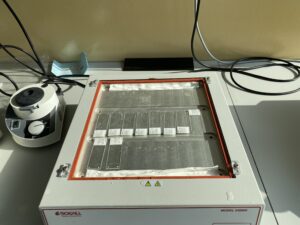
Image: Probe hybridisation on mitotic spread slides
Subsequent iterations of these experiments faced challenges due to equipment malfunctions and seed germination issues. Additionally, some protocols optimized for chickpea were not optimal for C. echinospermum, which limited probe visualization for several C. echinospermum accessions. In response, we prepared for future experiments at the University of Western Australia, where I can use the expertise I gained to optimise the protoplast suspension protocol and perform oligo-FISH barcoding to investigate genome structure diversity within C.echinospermum.
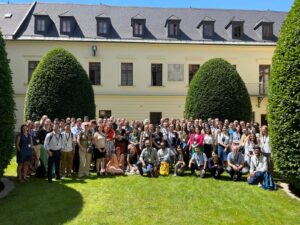
Image: Plant Genome Stability and Change, 2024
My time at the EMBO workshop was invaluable. Presenting my research sparked discussions with peers and leaders in my field. The exposure to innovative and intriguing research helped me develop ideas for future projects and opened my eyes to the opportunities available. It was fantastic to just spend four days discussing all of the new research in great company. All in all, a month spent in the European summer is never wasted. After long days in the lab, I often walked the perimeter of the old city, following the parklands that once formed a moat around the medieval fortifications ‒ a daily blend of the modern and the ancient. I can’t imagine a better place to have further developed my abilities in plant cytogenetics. The welcoming nature of everyone at UEB immediately made me feel at home, especially after a sunny afternoon roasting špekáček sausages over an open fire on the institute grounds, paired with Czech pilsner.
I am particularly grateful to Jana Cizkova and Eva Hribova, whose attentiveness, interest, and openness provided me with an unparalleled learning opportunity. Their introductions to research leaders from other labs at UEB sparked discussions that gave me novel insights and ideas for future research. I’d also like to thank my supervisor Judith Lichtenzveig, whose inspiration for the research trip, involvement in approach development, and ongoing supervision of this research project cannot be understated. Lastly, I thank the ASPS for awarding me the R.N. Robertson Travelling Fellowship, which allowed this research trip to take place, and the University of Western Australia’s Graduate Research School for additional funding.
Research Spotlight
Bacterial Biosensors: The cumate-inducible sfGFP expression system to study Rhizobium leguminosarum bv viciae – vetch interaction
Written by: Francine Perrine-Walker (PhD), The University of Sydney (LinkedIn | Google Scholar | X: PerrineWalker)
There have been some advances in the use biosensors in rhizobia to monitor oxygen and proline in Pisum sativum nodules [1,2], root exudates in the pea and vetch rhizosphere [3] and glutamine in the alfalfa, lentil, pea and soybean roots and nodules [4]. So, imagine if you could have a microscopic tool in your lab such as a Rhizobium bacterial cell sensing any compound released by a legume or a non-legume plant and monitor how such cells reacted in the rhizosphere or within roots.
In molecular biology, inducible gene expression systems (or vectors) have been useful tools for biotechnological applications. In such systems, an inducer, when present allosterically, binds to and renders inactive a transcriptional regulator/repressor which is bound to the operator sites in the promoter region of target genes [5]. Inducers can be anything such as glycerol [6], anthranilate [7], or even green light [8]. Kaczmarczyk and colleagues [5] demonstrated the advantages of inducible gene expression systems from Pseudomonas putida [9, 10] that could be induced in the presence of p-cumate and synthetic vanillate in sphingomonads and Alphaproteobacteria. Interestingly, Assoc. Prof. N. Coleman and M. Sommerville (University of Sydney) had a Rhizobium strain, R. leguminosarum bv. viciae 3841, in their collection expressing the cumate-inducible expression system i.e., the plasmid pUS248-sfGFP (superfolder green fluorescence protein).
To test this if the cumate-inducible expression system in R. leguminosarum bv. viciae 3841 could be used to monitor infection and nodulation of legumes in the presence of p-cumate, Namoi woolly pod vetch was used in two different growth conditions: a) the mounted glass-slide growth system previously described in Fahräeus [11] and modified in Perrine-Walker et al. [12] and, b) the standard nodulation assays [11, 13]. As inoculants, the wild-type R. leguminosarum bv. viciae 3841 (WT) and the transformant, R. leguminosarum bv. viciae 3841 expressing the pUS248-sfGFP were grown on YMA [14] and YMA agar plates supplemented with kanamycin at 25 µg/mL (Km 25) to maintain the pUS248-sfGFP in transformants and p-cumate at 50 mM to activate GFP expression at 30oC respectively. Plant materials (intact roots and/or sectioned, squashed nodules) were examined using fluorescence microscopy.
Preliminary results were encouraging. For the mounted glass-slide growth system, in the presence of p-cumate, GFP-expressing R. leguminosarum bv. viciae 3841 pUS248-sfGFP transformants adhered/attached to the surface of a root hair post 90 min inoculation (Fig. 1 c). At 24, 48 and 72 h, the fluorescent bacteria were found trapped in curled root hairs and within infected cortical cell regions below infected root hairs (Fig. 1 d-j) compared to control uninoculated vetch seedlings (Fig. 1 b). A GFP signal was observed in sectioned roots i.e., within infection threads traversing cortical cell region (Fig. 1 h-j).
For nodulation assays, no nodules were observed on the roots of uninoculated plants, whereas nodules were observed in WT strain inoculated plants post 21 and 30 d (Table 1). Furthermore, no or diffuse GFP signal was detected within infected cells of sectioned nodules of inoculated p-cumate treated R. leguminosarum bv. viciae 3841 pUS248-sfGFP-inoculated plants (Fig. 1 k-m). In NFN-medium, with and without p-cumate, no nodules were observed on control plants. Plants inoculated with WT strain formed nodules (Table 1) however in the presence of p-cumate, no GFP signal was observed in squashed nodules or in root sections under the microscope after 21 and 30 d post inoculation. In plants inoculated with R. leguminosarum bv. viciae 3841 pUS248-sfGFP in the absence of p-cumate, nodulation occurred (Tables 1) but no GFP signal was observed in nodules and on the surface of root sections after 21 and 30 d post inoculation. In the presence of p-cumate, GFP signals were observed on the surface of root sections, in infection threads found within curled root hairs that extended towards putative nodule primordia (Fig 1. n) post 21d inoculation and zone II section of vetch nodules on seedlings inoculated with R. leguminosarum bv. viciae 3841 pUS248-sfGFP post 30 d inoculation (Fig 1. p-o).
In conclusion, the cumate-inducible gene expression system did not affect root hair attachment and curling, infection thread infection and nodulation of the Rhizobium leguminosarum bv. viciae strain 3841 with the plasmid pUS248-sfGFP (superfolder green fluorescence protein) in the presence of p-cumate (summarized in Figure 2). The inducible expression vector with the superfolder GFP could be useful, but more work would be needed to determine if the construct could be modified to be inducible by another compound other than p-cumate.
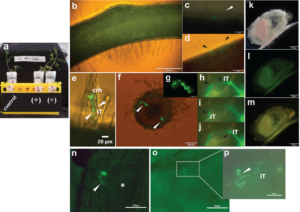
Fig. 1 Visualization of Rhizobium leguminosarum bv. viciae 3841 pUS248-sfGFP in vetch roots using the mounted glass slide method and nodulation assays; (a) Growth of individual vetch plants uninoculated (control) and inoculated with R. leguminosarum bv. viciae 3841 pUS248-sfGFP using the mounted glass slide method in the presence of Kanamycin at 25 µg/mL and p-cumate at 50 mM (+); (b) uninoculated vetch root (control); (c) GFP- labelled bacteria on the surface of an individual root hair post 90 min inoculation (white arrowhead); (d) root hair deformation (black arrowheads) and sfGFP-expressing rhizobia on the plant root surface; (e) sfGFP-labelled bacteria within two putative developing infection threads in a curled root hair (white arrow); (f) two infection sites within the cortical cell region of a sectioned vetch root (white arrowheads); (g) close-up of one the infection sites shown in (f); (h-j) close up of the infection site in (f) showing sfGFP-labelled rhizobia within the infection thread traversing three cortical cells; (k-m) hand-sectioned nitrogen-fixing nodule on a vetch root inoculated R. leguminosarum bv. viciae 3841 pUS248-sfGFP; (k) under bright field; (l) same nodule in (k) under the U-MGFPHQ filter specific for GFP; (m) same nodule in (k) under U-MWIB2 filter showing diffuse GFP fluorescence signals; (m)infection threads containing GFP-labelled rhizobia growing towards a putative nodule primordium (white asterisk); (n) infection thread junction with two sfGFP-labelled bacteria within a zone II nodule region; (o) squashed zone II region of a vetch nodule displaying infection threads with and without GFP signals and; (p) close up of an infection thread section in (o; white dashed rectangle) containing sfGFP-labelled rhizobia. Note – Images in (h-j) are the same region at three different focal planes to highlight the infection thread (IT). Fluorescence images (b), (c), (d), (e) and (f) were captured using U-MWIB2 filter with bright field light (h-j) and (m) with the same filter with no bright field light. Images in (g) and (l) were captured under the U-MGFPHQ filter specific for GFP only. (b) to (m) were captured using the Olympus BX51 microscope and seedlings were grown on Jensens plant media supplemented with p-cumate. (n) to (p) were captured using the Nikon Ti2 microscope and seedlings were grown on NFM supplemented with p-cumate. crh, curled root hair; IT, infection thread.
Table 1. Nodulation of Namoi woolly pod vetch by R. leguminosarum bv. viciae strain 3841 and R. leguminosarum bv. viciae 3841 pUS248-sfGFP post 21 d on Jensen’s and NFM plant growth medium without kanamycin. Each experiment had a total of 6 and 12 plants for each treatment respectively. The number of plants that nodulated were recorded post 21 or 30 d.
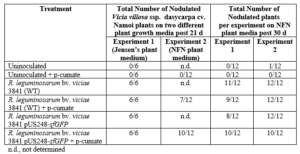
![]()
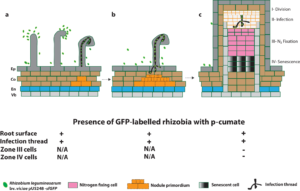
Fig. 2 Schematic diagram summarizing the expression of sfGFP in rhizobia in vetch in the presence of p-cumate in plant growth media. In the presence of p-cumate in plant growth media, GFP signal were observed on surface of vetch roots as well as to the tips of root hairs and curled root hairs and within infection threads (a). (b) sfGFP-labelled rhizobia were also in infection threads growing towards nodule primordia and (c) infection threads with the zone II of vetch nodules. No GFP signal were found in zone III and zone IV of vetch nodules.
Acknowledgments
I would like to thank Dr J. Hartley for kindly donating the vetch seeds and M. Sommerville for the Rhizobium strains and helpful advice as well as Profs. B. Kaiser and D. Guest for access to laboratory materials and fluorescent microscopes. I would also like to thank Assoc. Prof. N. Coleman for use of the Rhizobium strain expressing the plasmid pUS248-sfGFP. Plasmid pUS248-sfGFP (a gift from Nicholas Coleman’s lab, University of Sydney) was made by joining the replication and resistance regions of pBBR1MCS-2 [15] to the p-cumate regulatory system components derived from Pseudomonas putida [5] and the superfolder GFP gene (sfGFP) [16].
References
- Rutten PJ, Steel H, Hood GA, Ramachandran VK, McMurtry L, Geddes B, Papachristodoulou A, Poole PS (2021) Multiple sensors provide spatiotemporal oxygen regulation of gene expression in a Rhizobium-legume symbiosis. PLOS Genetics 17 :e1009099. doi:10.1371/journal.pgen.1009099
- Rubia MI, Ramachandran VK, Arrese-Igor C, Larrainzar E, Poole PS (2020) A novel biosensor to monitor proline in pea root exudates and nodules under osmotic stress and recovery. Plant Soil 452 :413-422
- Pini F, East AK, Appia-Ayme C, Tomek J, Karunakaran R, Mendoza-Suarez M, Edwards A, Terpolilli JJ, Roworth J, Downie JA, Poolea PS (2017) Bacterial biosensors for in vivo spatiotemporal mapping of root secretion. Plant Physiol 174 :1289-1306
- Thilakarathna MS, Raizada MN (2018) Visualizing glutamine accumulation in root systems involved in the legume–rhizobia symbiosis by placement on agar embedded with companion biosensor cells. Phytobiomes Journal 2 :117-128
- Kaczmarczyk A, Vorholt JA, Francez-Charlot A (2013) Cumate-inducible gene expression system for sphingomonads and other alphaproteobacteria. Appl Environ Microb 79 :6795-6802
- Doi Y (2015) L-lactate production from biodiesel-derived crude glycerol by metabolically engineered Enterococcus faecalis: Cytotoxic evaluation of biodiesel waste and development of a glycerol-inducible gene expression system. Appl Environ Microb 81 :2082-2089
- Hoffmann L, Sugue MF, Bruser T (2021) A tunable anthranilate-inducible gene expression system for Pseudomonas Appl Microbiol Biot 105:247-258
- Abe K, Miyake K, Nakamura M, Kojima K, Ferri S, Ikebukuro K, Sode K (2014) Engineering of a green-light inducible gene expression system in Synechocystis PCC6803. Microb Biotechnol 7:177-183
- Eaton RW (1996) p-Cumate catabolic pathway in Pseudomonas putida F1: Cloning and characterization of DNA carrying the cmt operon. J Bacteriol 178 :1351-1362
- Eaton RW (1997) p-Cymene catabolic pathway in Pseudomonas putida F1: Cloning and characterization of DNA encoding conversion of p-cymene to p-cumate. J Bacteriol 179 :3171-3180
- Fahräeus G (1957) The infection of clover root hairs by nodule bacteria studied by a simple glass slide technique. J Gen Microbiol 16 :374-381
- Perrine-Walker FM, Kouchi H, Ridge RW (2014) Endoplasmic reticulum-targeted GFP reveals ER remodeling in Mesorhizobium-treated Lotus japonicus root hairs during root hair curling and infection thread formation. Protoplasma 251 :817-826
- Jensen HL (1942) Nitrogen fixation in leguminous plants. II. Is symbiotic nitrogen fixation influenced by Azotobacter? Proc Linn Soc NSW 67: 205-212
- Allen EK, Allen ON (1950) Biochemical and symbiotic properties of the rhizobia. Bacteriol Rev 14 :273-330
- Kovach ME, Elzer PH, Hill DS, Robertson GT, Farris MA, Roop RM, 2nd, Peterson KM (1995) Four new derivatives of the broad-host-range cloning vector pBBR1MCS, carrying different antibiotic-resistance cassettes. Gene 166 :175-176
- Pédelacq JD, Cabantous S, Tran T, Terwilliger TC, Waldo GS (2006) Engineering and characterization of a superfolder green fluorescent protein. Nat Biotechnol 24 :79-88
Student travel grant awardees report – IBMP Cairns 2024
 Samuel James Nix – ANU (ACT)
Samuel James Nix – ANU (ACT)
Samuel Nix | ANU Research School of Biology
Overall, the conference was a fantastic experience. There were multiple plenary talks that I enjoyed. Robert Furbank’s C4 Rice Project presentation was a good presentation on how difficult multi-gene transgenic projects can be approached. It was also interesting to see how biotechnology has advanced in the past 15 years and how that impacted the feasibility of the project. Another talk I enjoyed was Mohammad Ishiyaku’s presentation on GM Cow Pea, a great success story about how a GM crop can be embraced by a developing country and the local communities and be adapted to meet the commercial desires of the public. A fun plenary talk was Susana Coelho’s on sex evolution in brown algae. Additionally, I presented my poster Elucidating and Engineering Cell Specific Cyclic Electron Flow in C4 photosynthesis and I won an award! Lastly, and most importantly, I made new connections with fellow scientists during the conference.
 Sara Jalali – UoA (SA)
Sara Jalali – UoA (SA)
Sara Jalali | Researcher Profiles (adelaide.edu.au)
I, Sara Jalali, had the privilege of attending the International Plant Molecular Biology (IPMB) Conference in Cairns, Australia, from June 24th to June 28th, 2024. This conference was an invaluable experience, allowing me to engage with leading researchers in molecular biology, a field that directly relates to my PhD work. The event facilitated the exchange of innovative ideas and the discussion of potential collaborative research opportunities. Additionally, it helped me expand my professional network and stay informed about the latest advancements in plant molecular biology. I am deeply grateful to the ASPS for funding my travel, enabling me to participate in this enriching event.
 Rana Alqusumi – UWA (WA)
Rana Alqusumi – UWA (WA)
Profile: Rana Alqusumi (plantenergy.edu.au)
At the end of June 2024, I attended the IPMB 2024 Congress in Cairns, thanks to the ASPS travel award. The event prominently featured emerging researchers in plant molecular biology. It was an honour to listen to scientists from around the world discuss their latest advancements in plant science. One of the highlights was a presentation by Prof. Mitter from the University of Queensland, who shared her team’s research on using clay nanosheets for delivering RNAi as pesticides. This innovative application of nanotechnology in crop protection was particularly enlightening. Additionally, I had the pleasure of engaging with fellow plant researchers, exchanging insights about our respective fields of work. The congress provided ample opportunities for networking and collaboration. Beyond the academic experience, I also enjoyed exploring the city of Cairns. Overall, attending the IPMB 2024 Congress was an enriching experience offering valuable knowledge and memorable interactions.
 Saber Sohrabi – UoA (SA)
Saber Sohrabi – UoA (SA)
Saber Sohrabi | Researcher Profiles (adelaide.edu.au)
I, Saber Sohrabi, attended the International Plant Molecular Biology (IPMB) Conference, which took place from June 24th to June 28th, 2024, in Cairns, Australia. By participating in this conference, I had the chance to connect with researchers in my field of study, exchange ideas, and explore potential collaborations for future research projects. The conference focused on molecular biology, aligning perfectly with my PhD project. This experience allowed me to expand my professional network, stay updated on the latest developments, and establish myself as an active member of the academic community. I would like to thank the ASPS for funding my flights to attend this conference.
 Alicia Quinn – Monash (VIC)
Alicia Quinn – Monash (VIC)
LinkedIn | Twitter AliciaQuinnSci
Attending the IPMB 2024 conference in Cairns was a great opportunity to see the latest research in plant molecular biology and meet the people behind the work. The conference started strong with two excellent plenaries that set the tone for the rest of the week: Gerry Turpin on protecting Indigenous knowledge and Tetsuya Higashiyama on signalling during reproduction. The concurrent sessions were equally diverse – covering everything from evolution to cell signalling – and it was a challenge deciding what to attend. Presenting my work in the metabolic engineering session was a highlight, and the supportive audience made it a fantastic experience. I really enjoyed the evening poster sessions and it was great to chat about the exciting research currently underway. This conference was an invaluable experience and I’m grateful for the support from ASPS to attend. I look forward to the next one!
Editors’ note
Phytogen will be back for our next issue in late October Don’t forget, registration and abstract submission for the local ASPS meetings for each state/territory in Australia and New-Zealand are now open!
For those working outdoors, remember to stay protected, cool and hydrated out there.

Recent Posts
Tags
Archives
- June 2025
- May 2025
- April 2025
- March 2025
- February 2025
- January 2025
- December 2024
- November 2024
- October 2024
- September 2024
- August 2024
- July 2024
- June 2024
- May 2024
- April 2024
- February 2024
- January 2024
- November 2023
- October 2023
- September 2023
- August 2023
- July 2023
- June 2023
- May 2023
- April 2023
- March 2023
- February 2023
- December 2022
- November 2022
- October 2022
- September 2022
- August 2022
- July 2022
- June 2022
- May 2022
- April 2022
- March 2022
- February 2022
- January 2022
- December 2021
- November 2021
- October 2021
- September 2021
- August 2021
- July 2021
- June 2021
- April 2021
- March 2021
- February 2021
- January 2021
- December 2020
- November 2020
- October 2020
- September 2020
- August 2020
- July 2020
- June 2020
- May 2020
- April 2020
- March 2020
- February 2020
- January 2020
- December 2019
- November 2019
- October 2019
- September 2019
- August 2019
- July 2019
- June 2019
- May 2019
- April 2019
- March 2019
- February 2019
- January 2019
- December 2018
- November 2018
- October 2018
- September 2018
- August 2018
- July 2018
- June 2018
- May 2018
- April 2018
- March 2018
- February 2018
- January 2018
- December 2017
- November 2017
- October 2017
- September 2017
- August 2017
- July 2017
- June 2017
- May 2017
- April 2017
- March 2017
- February 2017
- January 2017
- December 2016
- November 2016
- October 2016
- September 2016
- August 2016
- July 2016
- June 2016
- May 2016
- April 2016
- March 2016
- February 2016
- January 2016
- December 2015
- November 2015
- October 2015
- September 2015
- August 2015
- July 2015
- June 2015
- May 2015
- April 2015
- March 2015
- February 2015
- January 2015
- December 2014
- November 2014
- October 2014
- September 2014
- August 2014
- July 2014
- June 2014
Copyright 2017 Australian Society of Plant Scientists Disclaimer & Privacy
Website by Michael Major Media




